








At Imperial Health Charity we help our hospitals do more through grants, arts, volunteering and fundraising.


For the benefit of patients and NHS staff, we fund major redevelopments, research and medical equipment at five London hospitals - Charing Cross, Hammersmith, Queen Charlotte’s & Chelsea, St Mary’s and the Western Eye - as well as helping patients and their families at times of extreme financial difficulty.
Supporting the arts in healthcare, we manage an Arts Council accredited hospital art collection and run an arts engagement programme.
We also manage volunteering across all five hospitals, adding value to the work of staff and helping to improve the hospital experience for patients.
Fundraising through major appeals and community events enables us to continue our important work.
Charities are best able to demonstrate their value during times of greatest need - and in March 2020, when Covid-19 sent shockwaves around the world, that moment arrived for Imperial Health Charity. Supporting our extraordinary NHS colleagues throughout this period of extreme pressure has represented a profound challenge - but also a unique opportunity, a chance to show how NHS charities like ours can and do make a significant contribution to enhance the health service each and every day.
Over the last year we have played our part in helping our hospitals recover and rebuild, starting with the remarkable people who work morning, noon and night to care for us - our NHS staff. This year our funding has continued to make a real difference to the 14,500 staff at Imperial College Healthcare NHS Trust, with an expanded counselling service equipped to provide extra mental health and wellbeing support, and a major programme of improvements to break rooms, changing areas, showers and kitchens, ensuring staff are able to relax and unwind in comfortable, modern facilities before, during and after their shifts.
Alongside this essential support for staff, we are doing more than ever before to drive forward research and innovation across the Trust's hospitals. Through our grants programmes, we are awarding vital funds to help hospital teams provide even better patient care through pioneering advances in medical science and technology as well as offering emergency support to the most vulnerable patients and families at times of financial crisis.
People remain at the core of our work, and it has been hugely rewarding to see our arts facilitators and volunteers returning to wards over the last year. Through our arts engagement programme, we have provided opportunities for patients and NHS staff to explore the act of art-making as a mechanism for processing complex experiences and emotions as well as ensuring vibrant, colourful art remains on display throughout our hospitals. Meanwhile, the kindness and generosity of our volunteers, who do so much to lighten the load for hospital colleagues and offer a warm welcome to every visitor, underpins all our charitable work.
This year marks the end of our three-year strategy and our attention now turns to the future. What kind of charity do we want to be by 2025? While we will continue to provide extra support to patients and NHS staff in our hospitals, we also want to explore what more we can do to help people lead healthier lives in our local communities.
Working closely with the Trust, we will enhance and expand our work over the next three years to make sure we have the greatest possible impact – within and beyond the hospital walls. As part of this, it will be our ambition to work more collaboratively with other key healthcare partners and providers in our local communities as part of north west London’s integrated care system to address some of the most pressing health challenges we face, including tackling the deep inequalities in our society that so often pose a barrier to better health. We also have a wider role to play in strengthening the NHS charity sector as a whole, helping to build collaborative relationships with other organisations that are working to support hospitals up and down the country, and exploring opportunities to further develop our collective role as an important strategic partner to the health service.
Ian Lush OBE Chief Executive, Imperial Health Charity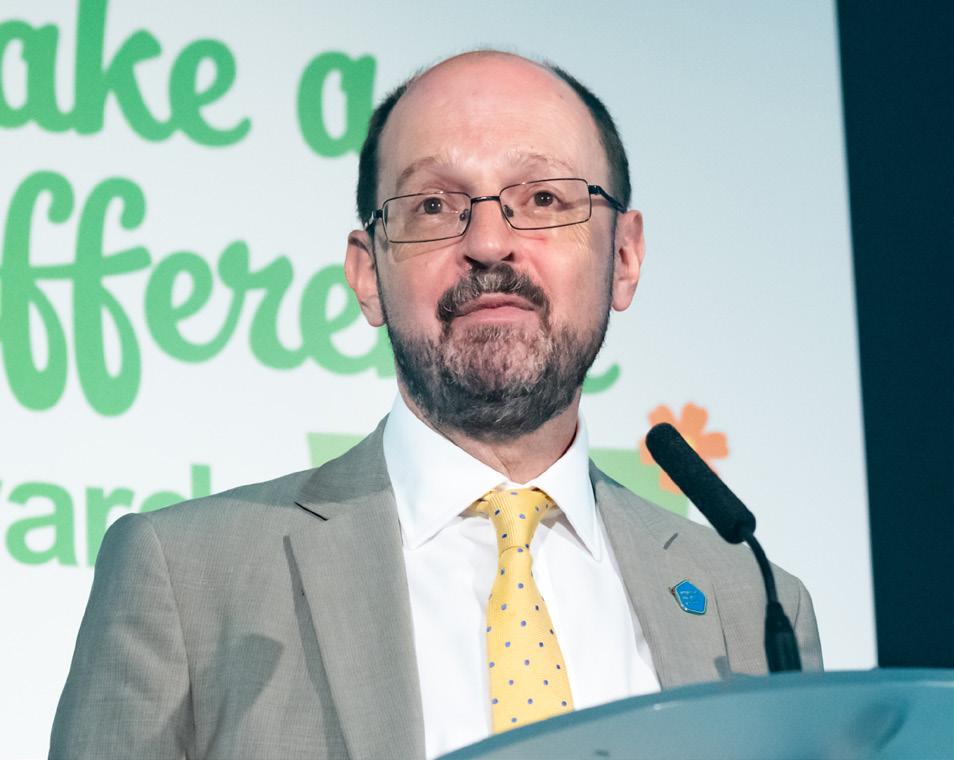


Imperial College Healthcare is one of the largest NHS trusts in the country, with 14,500 staff across north west London. During the year the Trust provided acute and specialist healthcare for around 1 million people.
With a reputation for excellence in research and education, the Trust’s five hospitals – Charing Cross, Hammersmith, Queen Charlotte’s & Chelsea, St Mary’s and the Western Eye – influence clinical practice nationally and around the world.

In addition, the Trust is developing a growing range of integrated and digital care services, and offers private healthcare in dedicated facilities at each of its hospital sites.
Together with Imperial College London, Chelsea and Westminster NHS Foundation Trust, and The Royal Marsden NHS Foundation Trust, it forms the Imperial College Academic Health Science Centre – one of eight academic health science centres in the UK. This close working partnership ensures that cutting-edge research can be translated quickly into better patient care and excellence in education.
Imperial College Healthcare is also a major provider of education and training for doctors, nurses, midwives and allied health professionals, including therapists, pharmacists, radiographers and healthcare scientists.
The Trust’s five hospitals specialise in a number of different areas:

Charing Cross Hospital provides a range of acute and specialist services, including cancer care and a 24/7 accident and emergency department. It also hosts the hyper-acute stroke unit for the region and is a growing hub for integrated care in partnership with local GPs and community providers.
Hammersmith Hospital is renowned for its strong research connections. It offers a range of services, including renal, haematology, cancer and cardiology care, and is home to the region’s specialist heart attack centre.
Queen Charlotte’s & Chelsea Hospital is a maternity, women’s and neonatal care hospital, also with strong research links. It has a midwife-led birth centre as well as specialist services for complicated pregnancies, fetal and neonatal care.
St Mary’s Hospital is the major acute hospital for north west London as well as a maternity centre with consultant and midwife-led services. It provides care across a wide range of specialties and runs one of four major trauma centres in London in addition to its 24/7 A&E department.
The Western Eye Hospital is a specialist eye hospital with a specialist A&E department.



The Trust’s mission is to serve as a key partner in our local health system, drive innovation in healthcare and deliver outstanding care, education and research with local, national and global impact. As the Trust’s dedicated charity, our role is to support and enhance this important work for the benefit of patients and NHS staff.




In recent years Imperial College Healthcare has been at the forefront of the medical response to several major incidents, including the terrorist attacks at Westminster Bridge and London Bridge, and the Grenfell Tower fire in 2017.
The Trust also featured in the debut series of BBC Two's documentary Hospital and played host to the world's media for the royal births of Prince George (2013), Princess Charlotte (2015) and Prince Louis (2018).
As the dedicated charity for Imperial College Healthcare NHS Trust, we help our hospitals do more through grants, arts, volunteering and fundraising. Our activities support hard-working hospital staff while improving the care that patients receive – above and beyond what the Trust can achieve with NHS funding alone. We deliver supportive programmes that enhance the overall hospital experience for staff and patients as well as awarding funding for healthcare projects that enable the Trust to provide an even better service.
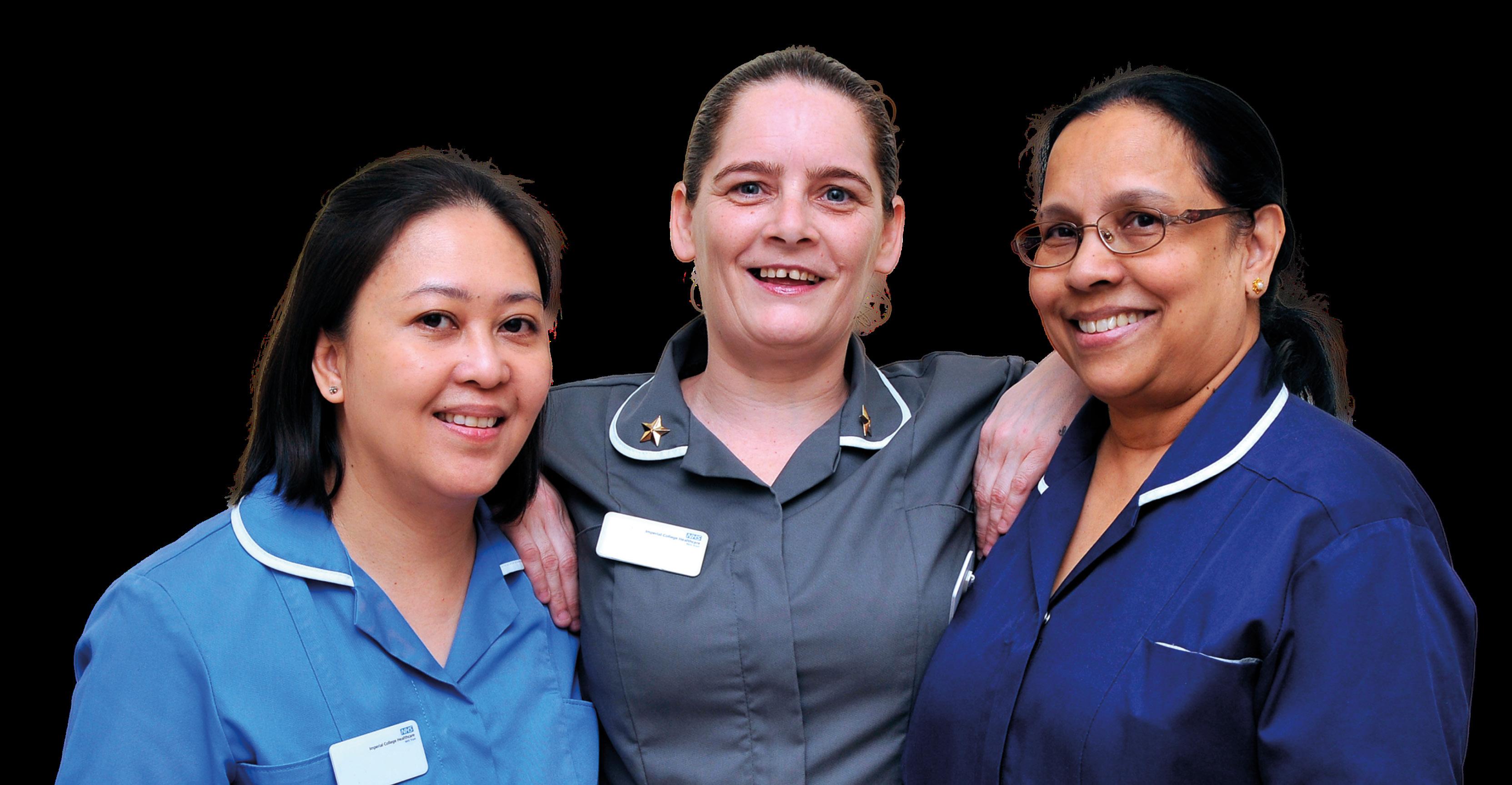
Through our grants programmes, we fund a range of projects and initiatives to improve patient care and hospital experience, support the wellbeing and professional development of NHS staff and enable innovation across the Trust’s five hospitals and its wider communities.
We fund major refurbishments to hospital buildings and facilities, invest in pioneering new research and provide additional medical equipment as well as helping patients and their families at times of extreme financial difficulty.
Our support goes above and beyond what the NHS can achieve on its own – helping our hospitals provide outstanding care 365 days a year.
We believe that art and creativity are key to our health and wellbeing, and can enhance the hospital experience for patients, family members and other visitors as well as contributing to a better working environment for NHS staff.
Through a comprehensive arts engagement programme and an Arts Council accredited collection of more than 2,500 artworks, we help to brighten hospital hallways, wards and waiting areas, and deliver uplifting creative activities in clinical settings.
Throughout the year we organise installations, run exhibitions and deliver arts engagement activities for patients at the bedside as well as offering hospital staff free entry to some of London’s top museums and galleries through our Staff Arts Club.
•
Volunteers play an essential role in helping our hospitals do more for patients and their loved ones.

Pointing visitors in the right direction, assisting NHS staff or simply offering an ear to listen, volunteers are a helping hand to everyone who passes through our hospitals.

Since taking over the management of volunteering at our hospitals in 2016, we’ve significantly increased volunteer numbers, created a range of dynamic new roles and developed our infrastructure to provide a high-quality experience for our volunteers and the NHS staff they work with.
In recognition of our high standards of volunteer management, we were awarded the highly-regarded Investing in Volunteers status in 2019 and were recognised for our Covid-19 response in the Mayor of London’s Volunteering Awards in 2020.

say they would take part again
We share Imperial College Healthcare’s commitment to ‘better health, for life’ and strive to help our hospitals provide the best possible care by driving forward initiatives that improve the hospital experience for patients, enhance the wellbeing of NHS staff and enable innovation in healthcare.
To help us deliver these goals, we set out an ambitious three-year strategy in 2019 - a plan we completed at the end of the 2021/22 financial year.
During this period, we set an overarching goal to enhance the charity's role as a key enabler of improvement and transformation in health and care in London. We committed to achieving this vision by delivering three operational objectives:
• improve patient experience and help to deliver true patient-centred care
• develop the careers and enhance the wellbeing of NHS staff at the Trust
• enable innovation in health and care within the Trust and the wider health system.
We worked to deliver these objectives through our grants, arts, volunteering and fundraising programmes, and prioritised four key ‘enabler’ factors to ensure we set ourselves up for success:
• income generation through our fundraising activities and investments
• raising our profile within the hospitals and wider community
• evaluating and celebrating the impact of our work
• developing and supporting our internal staff team.
Through this strategy, we pledged to put people at the centre of everything we do. With patients at the forefront, we increased
our efforts to improve the experience of care for everyone who visits our hospitals, which we believe leads to better outcomes for their health and wellbeing. We also continued to invest in clinical innovation, ground-breaking medical equipment and pioneering research to improve the care that patients receive, while focusing on how we champion our NHS staff through new professional development opportunities.
Lastly, we explored opportunities to work beyond our hospitals by supporting and collaborating with the Trust, with other NHS charities across the country, and with other public, private and voluntary sector partners to make a real difference to health and care on an even bigger scale.
The key elements of our 2019-22 strategy are outlined in the graphic on p11.
The charity has undergone a sustained period of growth and development over the lifetime of this strategy. During the last three years we have expanded our activities in several areas to enhance our impact, and increased our staff team and operational facilities accordingly to ensure we are appropriately resourced to support our ambitions.
Alongside the expansion of our grants, arts and volunteering programmes, a significant area of development has been our approach to impact measurement and evaluation. Having identified an area of need at the beginning of the strategy period, impact and evaluation has been established as a core function of our day-to-day operations and helped to embed a culture of learning and improvement across the organisation.
We significantly exceeded our three-year fundraised income target of £10.5m, raising a total of £14.7m over the strategy period. Our fundraising activities in 2020/21 and 2021/22 were impacted by the Covid-19 pandemic,








with an increased focus on philanthropy and corporate income during a period in which community and events fundraising was significantly limited. Additional efforts have been made to maximise our income from legacies as well as increasing grateful patient giving through a promotional campaign to improve the charity’s visibility and presence within the hospitals, and efforts to engage Trust consultants and clinicians.
Significant organisational resilience was demonstrated in our response to the Covid-19 pandemic – particularly between April and September 2020 – during which time we were able to adapt and remodel our operational activities to provide effective emergency support to the Trust as well as working with NHS colleagues to rapidly identify appropriate Covid response initiatives for charity funding.
Major achievements during the strategy period included: establishing a new intersectoral innovation funding programme supporting NHS teams to develop novel and forward-thinking approaches to healthcare challenges; delivering a series of successful artist-in-residence initiatives for the benefit of patients and NHS staff; securing Investing in Volunteers accreditation for our hospital volunteering programme; raising over £3m through our Covid-19 Relief Fund and rapidly committing these funds to support urgent response initiatives.
There were a number of specific areas of activity within the strategy where we did not deliver our plans as originally intended. These were mostly caused by unexpected circumstances or interventions – such as the impact of Covid-19 - and we have identified related learning points to provide insight for future planning and objective-setting.
Examples include:
• Developing our charity membership offer for NHS staff at the Trust
Limited progress was made towards our aim of expanding the Staff Arts Club to encompass a wider package of benefits and charity information to engage NHS staff. Although we’ve broadened the scope of
regular communications to promote aspects of our other charitable activities, we’ve reflected on the way in which opportunities to develop new engagement activities were restricted after the onset of the pandemic and additional budget and staff resource was prioritised in other areas.
Creating opportunities for NHS staff to volunteer with us
In developing the strategy we identified opportunities to raise the profile of volunteering within the Trust and engage NHS staff in the wider volunteering programme by creating patient-facing roles in which staff themselves could opt to volunteer. This was initially trialled at a departmental level in a small number of teams but the demands of responding to Covid-19 ultimately impacted the capacity for staff to volunteer outside their principal roles.
Funding major transformation projects within and beyond the Trust's hospitals
During the strategy period we experienced challenges around ensuring alignment between funding requests and broader strategic priorities. Moving forward, we’ve identified the potential to create an informal committee of key Trust stakeholders to help us identify the most strategically relevant and impactful projects to support.
Providing financial support for the Trust's recognition scheme celebrating the achievements of NHS staff
In 2019 we committed to awarding an annual grant to the Trust’s People and Organisational Development division to support a range of initiatives linked to the wellbeing and professional development of NHS staff. However, the significant focus on staff wellbeing and facilities improvements within the Trust’s Covid-19 staff legacy programme – supported by our £1.7m grant – led us to re-evaluate how we can provide effective wellbeing support in future, with a focus on creating more agile and responsive funding mechanisms.
For information about our strategic plans for 2022-25, please turn to p40.


Thanks to the extraordinary generosity and goodwill of our many supporters, our fundraising activities have enabled us to continue helping our hospitals do more over the past year.
In 2021/22 we exceeded our budgeted fundraised income, raising £4.47m in total against a target of £1.95m. This followed an exceptional year in 2020/21 during which the success of our Covid-19 Relief Fund at the peak of the pandemic enabled us to significantly increase our fundraised income.
Our total fundraised income for the year comprised:
£2.52m from philanthropic donations
• £739k from grants received £477k from legacies
• £391k from community fundraising activities and events
• £347k from corporate gifts
Following a year in which our fundraising activities were significantly influenced by Covid-19 and the impact of the pandemic, our fundraised income in 2021/22 was generated largely through philanthropic and corporate gifts.
A smaller share of our income was drawn from legacies, community fundraising events and grants - mainly for research - received from the health sector and higher education institutions.
During the year we developed our active event model, which enabled us to offer a wider range of challenge events for our supporters to take part in. This also helped us reduce costs and mitigate the risk of losing
event places. We ran our flagship fundraising event - Walk For Wards - as a virtual event in July 2021, partnering with Enthuse to use a new fundraising platform to support more effective online sponsorship.
In addition, we developed the supporter journey for our in-memory donors, including the use of a new platform - Much Loved. As part of this work we provided specialist bereavement training for all members of our fundraising team.
Finally, we made improvements to the donation functionality on our website, which led to a significant increase in the number of online donations received compared to the previous year.
Philanthropic income continues to be a significant area of growth for us. During the year we secured the largest donations on record, ranging from pledges of £500k to £2.25m. This included the donation of a piece of property, which was initially transferred to us before being sold within a six-month period during the year.
Identifying grateful patient giving as an additional opportunity for growth, we have continued to proactively engage with consultants at Imperial College Healthcare. This ongoing work is enabling us to rely on consultants as advocates and ambassadors for our work, as well as connecting us to patients who have had a positive experience of care and are interested in making a gift.
We ran two short-term fundraising appeals during the year - the Time For Play Appeal and the Lifestart Appeal - raising valuable funds for the paediatrics and maternity services respectively.
In 2020/21 we identified a key priority to expand our database of external supporters, so that we might communicate more effectively with a larger number of contacts. Working with our communications team, we
built on this work in 2021/22, increasing our database. This has largely been enabled by creating opportunities during the hospital journey for patients and visitors to opt in to our regular communications - in particular through a prompt added to the hospital wifi portal.
Additionally, we worked with the grants department to establish a number of new, unrestricted funds to encourage a greater number of gifts with fewer restrictions.

We are reliant on the support of our many donors and fundraisers to continue our charitable work and we are extremely grateful to each and every one of them for their generosity and goodwill. Whenever possible, we have organised hospital tours and small events - including virtual events - to engage and thank our donors for their support. Fundraised
Our grants programme provides funding for a range of projects and initiatives to improve patient care and hospital experience, support the wellbeing and professional development of NHS staff and enable innovation. In total, we awarded £3m through our grants programme during 2021/22, with an additional £1.3m awarded from fund advisor special purpose funds (see p21).
Although most of our grant-making to support the Trust's response to Covid-19 occurred in 2020/21, we continued to fund a small number of related projects during the 2021/22 year. This included a grant of £150k to make the Trust's faster, premium wifi service available to hospital patients, visitors and staff for free. In total we awarded £202k in Covid-19 support grants during the year.
Covid-19 has had a big impact on the provision of clinical care in our hospitals, but the pandemic has also deepened many complex health problems in our wider communities. An important strategic goal has therefore been to develop an approach to supporting integrated care initiatives, working in partnership with Imperial College Healthcare.
During the year we implemented a new funding programme - Compassionate Communities - through which we awarded grants to support local projects led by community organisations in north west London. In the previous year, we awarded £360k to support a wide range of projects, each aiming to address a major health problem deepened by the impact of the pandemic, including: mental health and wellbeing; food poverty and obesity; and language barriers and misinformation.
During 2021/22, the recipients of these grants reported back on their progress. An interim
evaluation carried out by the NIHR Applied Research Collaboration Northwest London found that the progamme had benefited around 5,000 of the most vulnerable people in the area, with almost 2,000 referred to appropriate support services and more than 350 training events and workshops delivered.
A full evaluation of the programme will be carried out during 2022/23, with key learnings and insights to inform the development of a similar place-based funding initiative in future.
To read more about Compassionate Communities, please turn to p20.
Our Innovate at Imperial programme provides funding to help NHS staff develop new and innovative ideas for improving care. During the year we ran a further funding round, awarding 11 grants of up to £85k to support staff who challenge traditional ways of working and accelerate progress.
The programme has proved extremely popular with NHS staff and we were able to award a total of £744k to support innovation projects during the year, including initiatives that strengthen hospital processes, improve safety and support the health and wellbeing of staff.
Notable projects that benefited from funding included an innovation supported by the Mercedes F1 team to enhance staff and patient safety during tracheostomy surgery, a scheme exploring ways to curb the Trust's carbon footprint by recycling personal protective equipment and a project addressing pyschological problems among children admitted to intensive care.
Our Research Fellowships programme provides opportunities for health professionals to take time away from their current role to pursue a research project.
Grants awarded, 2021/22. Total: £4.3m
We provide fellowships of up to £80k, which may be used to support an individual’s salary and related research expenses during their project.
Run jointly with the NIHR Imperial Biomedical Research Centre, the programme provides a platform for NHS staff to progress their clinical academic careers through further study. During the year, 10 fellowships were awarded with a total commitment of £661k.

We award emergency hardship grants to support patients and their family members experiencing extreme financial difficulty as a direct result of their time in hospital.
Grants of up to £1.5k are awarded to help patients and their families cover everyday costs, such as travel, accommodation, food
and other essentials. These grants may also be used to help bereaved families cover funeral costs up to £1k.
During the year we saw a continued increase in demand for emergency hardship support, largely due to the impact of the pandemic. A total of 117 patient hardship grants were awarded in 2021/22, totalling £67k. 33% of these grants included expenditure on food, with 38% including travel costs, 18% including other essential items, 5% including funeral costs and 4% including hotel accommodation.
Our small grants provide funding for smallscale projects that enhance the hospital environment, improve patient care and staff amenities, or otherwise contribute to the improvement of NHS services. In 2021/22
ANNUAL REPORT AND ACCOUNTS, 2021/22
During the year we delivered a pioneering new initiative to help transform the health and wellbeing of people most adversely affected by the hidden impacts of Covid-19.
Working in partnership with Imperial College Healthcare NHS Trust, we supported 20 local projects as part of our Compassionate Communities programme. These grants enabled a range of charities, community organisations and local groups to help those most in need access vital care and support.
Each of the projects we supported addressed a major health problem deepened by the impact of Covid-19, including: mental health and wellbeing; food poverty and obesity; and language barriers and misinformation.
In the first six months of the year alone, our funding benefited around 5,000 of the most vulnerable people in north west
London, with more than 350 training events and workshops held in the community.
An evaluation of the programme found that our funding had helped connect people to appropriate services, improve their mental and phsyical health, and help them build skills, as well as facilitating social cohesion and developing relationships in the local community.
 ABOVE: A cooking workshop held by Hammersmith Community Gardens Association.
ABOVE: A cooking workshop held by Hammersmith Community Gardens Association.
“We've been able to have a transformative impact on health and wellbeing by building strong relationships with local groups who really understand the needs of their communities.”
Dr Bob Klaber, Director of Strategy, Research and Innovation, Imperial College Healthcare
we awarded small grants of up to £10k to 15 individual projects, spending £90k in total.
As part of the development of our long-term organisational strategy (2022-25), we reviewed the impact of the small grants programme during the year. Following this review, we have developed plans to focus the programme towards supporting small-scale improvements to patient care and hospital experience from 2022/23.
To ensure we allocate charitable funds in line with the preferences of our donors, we oversee a number of special purpose funds. These restricted funds, reserved for specific areas of clinical specialty, enable us to contribute to a wide range of healthcare projects and staff wellbeing initiatives support ing a series of wards, departments and services across the Trust’s hospitals.

Our larger restricted donations are placed in ‘trustee-controlled’ special purpose funds, which allow our trustees greater oversight of funding towards specific grant awards in accordance with donors’ wishes and our broader strategic aims. Other smaller restricted donations are placed in ‘fund advisor’ special purpose funds, which enable NHS staff to direct funds within their area of specialty under delegated authority.
Fund advisor special purpose funds are often used to fund small-scale initiatives and research projects. Among the largest and most significant of these funds are Poppy’s Fund, which supports maternity services at Queen Charlotte’s & Chelsea and St Mary’s hospitals, and The Blood Fund, which supports clinical research at Hammersmith Hospital’s haematology department.
During the year we began an ongoing programme of work to improve the efficiency of special purpose fund management. This has involved efforts to engage and support individual fund advisors, with a focus on improving financial reporting, accelerating the expenditure of funds towards relevant projects and maximising fundraising activities.
In 2021/22, we awarded £1.2m through trusteecontrolled special purpose funds and £1.3m through fund advisor special purpose funds.
of patient hardship grants awarded within target of two working days

average value of hardship grant awarded to patients in urgent need of our small grants were focused on improving patient wellbeing


grants awarded to support innovation projects at our hospitals

of our research fellowships in the past three years awarded to women

With a comprehensive arts engagement programme and a museum-accredited collection of more than 2,500 artworks, we work to enhance the hospital experience and clinical environment for patients and NHS staff.
Through our arts programme we install permanent displays, organise exhibitions, stage events and run creative workshops within our hospitals, as well as providing activities for families, visitors and the wider community.
Through our curatorial programme of commissions and installations, 158 new artworks were acquired and 204 were permanently displayed across our five hospitals for the enjoyment of staff, visitors and patients.
Notable installations included a selection of colourful artworks by a group of artists including Rana Begum, Ben Eine, and Adam Bridgland, which is currently brightening the children's ward at St Mary's Hospital, and a series of murals by Frea Buckler in the PET CT
In a survey carried out in July 2022, 93% of NHS staff at Imperial College Healthcare agreed that the artwork in their hospital made it a better place to work.
Through our Art in Focus programme, we displayed five different exhibitions over the course of the year in our permanent exhibition spaces at Charing Cross, Hammersmith, and St Mary’s hospitals.

These included: Dana Popa's A Portrait of our Trust; Anthony Wishaw RA's Illusions and Horizons; Bindi Vora and Alys Tomlinson's Looking Back, Looking Forward; Jealous Gallery's Contemporary Printmaking; and Thank You!, a compilation of artworks reflecting on the enormous contribution made by NHS staff in responding to Covid-19.
Changes to Covid-19 guidance meant we were able to resume many of our in-person engagement activities after the previous year had seen a significant shift towards virtual activities. In total, we delivered 148 sessions during the year, engaging 1,500 patients and
BELOW: Contemporary Printmaking at Hammersmith Hospital.Wellbeing workshops were also able to resume in-person from September. Led by artist Marenka Gabeler, the sessions are now taking place at Kindred Studios, a creative hub in Shepherd's Bush, and are regularly attended by current and former patients.
Photographer Sunil Gupta, whose residency was put on hold due to the pandemic, spent the year working with patients and staff in the Adult HIV Clinic at St Mary’s Hospital and the Gender Affirmation Surgery service at Charing Cross Hospital. His resulting exhibition was subsequently displayed at Studio Voltaire and at three of our hospital sites.
Working with members of NHS staff from Black, Asian and minority backgrounds, Aida Silvestri also began a residency encouraging collaborators on a traditional quilting pattern and patchwork portraits to share their reflections on the pandemic in a large artwork which will be displayed across our three main hospital sites.
In July 2021, we supported Imperial College Healthcare's 'Gratitude Festival' - a week of events thanking NHS staff for their hard work and commitment throughout the pandemic. We worked with artist Julian Opie to design a limited edition commemorative badge for every member of staff. We also organised a series of art workshops, held across our three main hospitals.





Through our Staff Arts Club, we continue to offer a range of benefits designed to encourage NHS workers to enjoy London’s vibrant arts and culture opportunities. Staff can gain free entrance to the Victoria & Albert Museum, the Royal Academy of Arts and the Tate galleries as well as accessing a range of exhibitions and events. We also offer a monthly ballot for seats in the charity’s box at the Royal Albert Hall.
All the venues we’ve partnered with for our Staff Arts Club gradually reopened during the year, often with precautions or booking requirements, and members were once again able to enjoy the benefits.

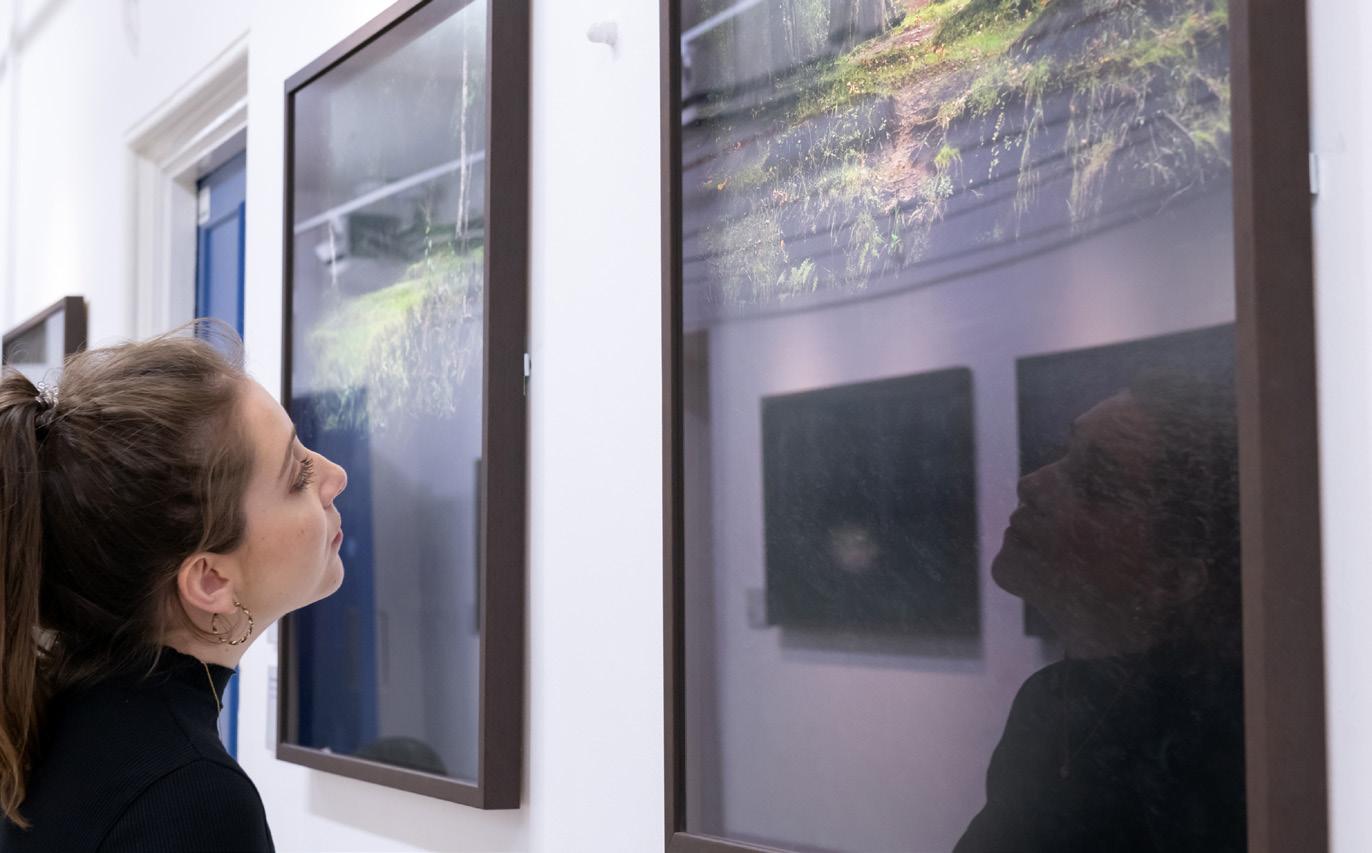
During the year we gradually reintroduced volunteers back into clinical settings in line with infection prevention and control guidance at the Trust's hospitals. This followed a year of significant disruption to our normal volunteering programme in 2020/21, during which time we paused many of our wardbased activities and adapated our volunteer roles to provide urgent support at the peak of the pandemic.

In 2021/22, we were able to place volunteers in 'meet and greet' roles providing advice and directions to visitors in main entrance areas as well as mealtime support positions supporting staff to serve lunches and dinners to inpatients on wards. Volunteers also played a key role in assisting with the Trust's Covid-19 vaccination hubs, helping to provide guidance and support to NHS staff arriving for their jabs.
In addition to these regular roles, our volunteers gave their time to support a number of events and activities with a focus on enhancing the wellbeing and morale of NHS staff. This included helping to coordinate the Trust's 'Gratitude Festival' event in July 2021, delivering boxes of breakroom supplies to wards and departments and serving meals for staff at special food and drink events. Volunteers also played their part in the Trust's 'Better Together' week, which aimed to encourage collaboration among teams in order to improve patient flow at peak times.
Across all our roles, a total of 547 people volunteered their time to support our work during the year, contributing over 17,000 hours across 46 hospital departments and services. Volunteers completed over 6,000 shifts and recorded 45,000 interactions with patients. Feedback from our volunteers indicated that they feel overwhelmingly positive about volunteering in our hospitals, with an average shift rating of 4.59 out of 5. Our annual survey of NHS staff carried out in July 2022 also revealed that 98% of respondents felt the contribution of volunteers makes their hospital a better place to work.
volunteers who gave their time to help our hospitals in 2021/22
Largely due to a significant turnover of staff within our volunteering department, we were unable to make significant progress with regard to a small number of activities as originally intended at the beginning of the year. With these resource limitations we paused the development of new volunteer leadership roles and a review of our volunteering policy, both of which will be continued in 2022/23.





During another challenging winter for the Trust's hospitals, ensuring a smoothrunning vaccination programme became a key priority.
That's why we introduced Vaccine Clinic Support Volunteers at Charing Cross, Hammersmith and St Mary's hospitals, providing a shot in the arm for staff administering Covid-19 and flu jabs.
Our friendly volunteers have been on hand throughout, welcoming staff and visitors for their appointments and making sure they find their way.
They have also played an important role in observing visitors after receiving their vaccine, and following up with clinical staff if they experience any concerns.
"When our volunteers first started supporting the vaccine clinics at the start of the year we received incredible
feedback from NHS staff about the impact they made," said Sam Morris, Head of Volunteering. "We've been so pleased to bring back our volunteers during the autumn and winter to help alleviate pressure on the NHS at this critical time."
Earlier in the year our volunteers also supported NHS staff in running the initial Covid-19 vaccine clinics, helping thousands of people in north west London receive their first and second doses. Between 1 January 2021 and 31 August 2021, a total of 229 volunteers completed 926 shifts, racking up almost 3,000 hours of invaluable support for our hospitals.
Member of NHS staff Big Charity Survey 2022
 ABOVE: Volunteer Sanjay at the Trust's vaccination clinic at St Mary's Hospital.
ABOVE: Volunteer Sanjay at the Trust's vaccination clinic at St Mary's Hospital.
“The volunteers have been amazing. Always friendly and helpful around the hospital.”


We believe every patient deserves the best possible hospital experience. That’s why, across all areas of our work, we put patients at the heart of everything we do.
Through our grants, arts and volunteering activities, we strive to help our hospitals provide outstanding care for patients and their families.
Whether supporting a major redevelopment, offering creative arts activities for inpatients or enabling volunteers to help visitors find their way, our work makes sure patients feel supported and that their time in hospital is as positive as it can be.
To help us achieve this objective, we said we would:
• provide grants opportunities to help the Trust make fast and effective improvements to patient-facing services and the hospital environment
• continue to curate and develop our art collection and engagement activities
• engage volunteers in roles which interact with patients above and beyond the work of NHS staff
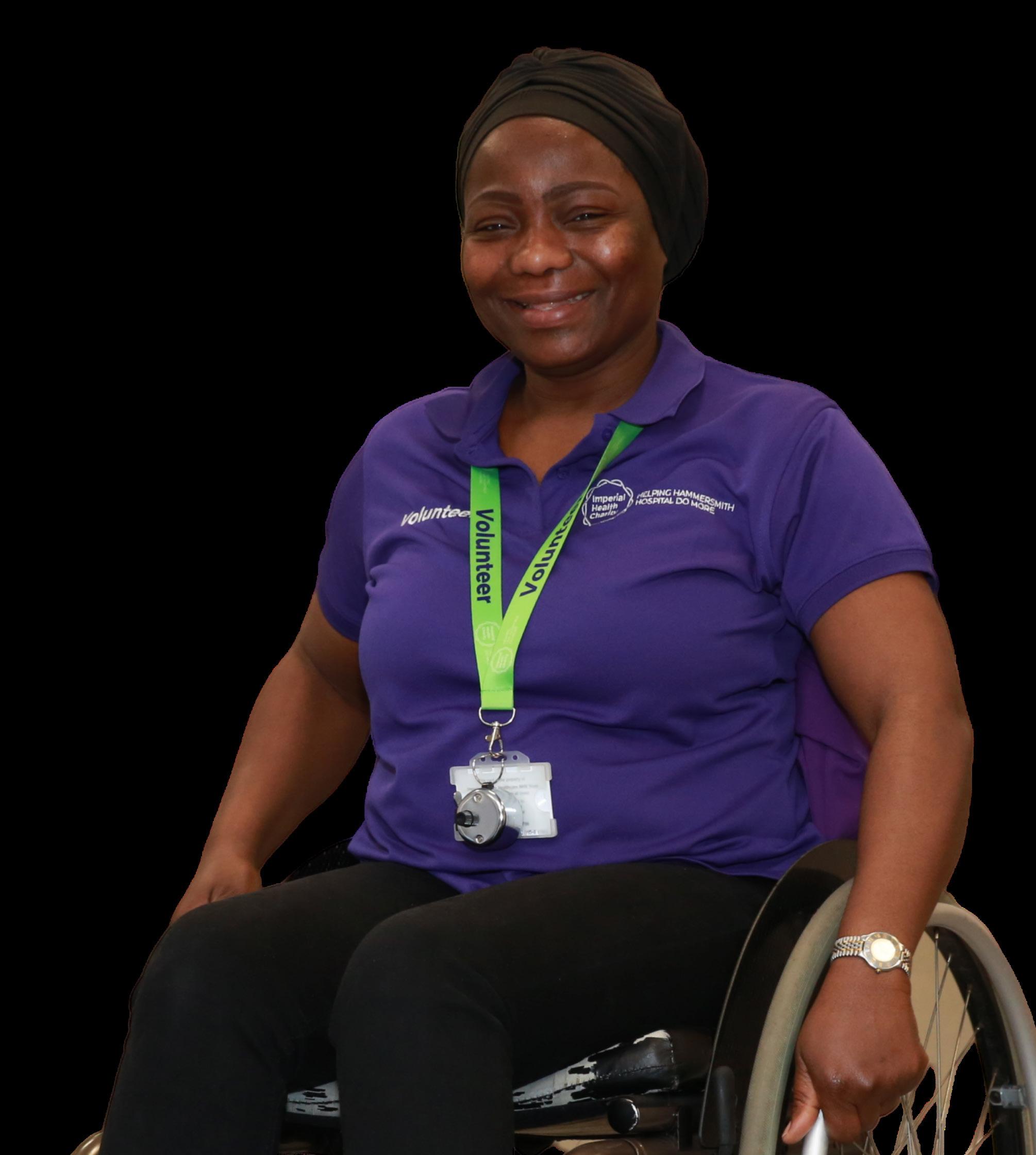
support patients and families in extreme financial difficulty during their treatment.
In 2021/22, we:
• awarded 117 emergency hardship grants to support patients and their families at times of extreme financial crisis
• engaged 547 volunteers who contributed over 17,000 hours to help our hospitals in a variety of supportive roles
• delivered a wide range of creative arts activities to support over 1,500 patients and staff on wards and at the bedside, delivering 148 participatory sessions.
As Covid restrictions gradually eased during the year, we were able to reintroduce many of our participatory arts activities for patients in clinical areas as well as returning volunteers to ward-based roles offering companionship and practical support to those receiving care in hospital.
For patients facing extreme financial difficulty as a result of their care, we were able to continue providing emergency support through our patient hardship grants. During the year we experienced high demand for the service, with a 7% increase in the number of grants awarded compared to 2020/21.
In a survey carried out in July 2022, 97% of NHS staff working at the Trust agreed that our support enhances the overall hospital experience for patients.
Spending time in hospital can be a distressing experience for young patients. Poor health, anxiety and unfamiliar surroundings can lead to upsetting and stressful situations.
That's why we've supported regular music therapy sessions for those receiving care on the paediatric wards at St Mary's Hospital.
During the year, music therapist Natasha Larkin provided nearly 400 tailored sessions for over 150 children. Using her guitar and a range of percussion instruments, Natasha's visits have offered a calming space for young patients to explore musical interactions and sounds.


100% of NHS staff who worked with Natasha agreed that her music therapy sessions helped to distract patients from physical pain, discomfort and anxiety during their time in hospital.
Member of staff, Neonatal Intensive Care Unit at St Mary's Hospital


“This is an amazing add-on to our service and particularly helpful for patients with neurodevelopment issues.”
Natasha Larkin, Neurologic Music Therapist
"There's a lot of hesitation and a lot of fear among the patients. But when I take out my instruments it immediately defuses a lot of the anxiety, especially in the younger children."
During the pandemic, visiting restrictions have been tough for many patients. With opportunities for friends and family members to visit limited by Covid-19 precautions, feelings of loneliness and isolation have often been exacerbated.
During the year, however, we were able to welcome back our regular Mealtime Volunteers to offer a friendly face and a healthy meal for patients staying in a variety of wards.
By building a rapport with patients, Mealtime Volunteers have been able to provide important companionship support as well as collecting patient feedback and meeting an area of need identified by NHS colleagues.

For the safety and peace of mind of everyone in our hospitals, the role was relaunched with safety as a priority. All our volunteers received thorough training on infection control procedures and the use of protective equipment.
“Patients are really happy when they see a volunteer. You can see their mood brightens up. I'm doing a Masters degree and volunteering really takes away the stress from all the studying."
Mohammad Mealtime Volunteer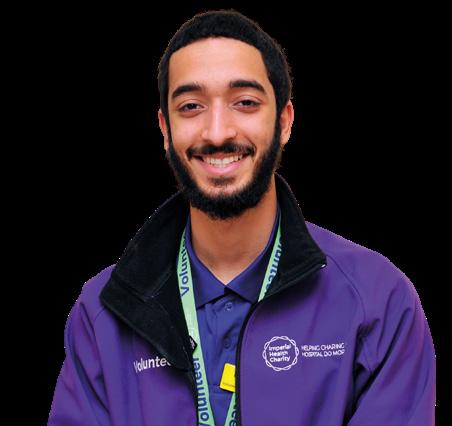
of Mealtime Volunteers agree they made a useful contribution during the pandemic
ABOVE: Mealtime Volunteer Michael at Charing Cross Hospital.For many patients facing an extended stay in hospital or ongoing treatment for a longterm condition, looking after their health isn't the only concern. Transport costs, household bills and supermarket trips for basic essentials can quickly mount, leaving patients and their families in a perilous financial position at the worst possible time.
Over the last year, however, we provided emergency support for many families facing this unimaginable situation. In total, we awarded 117 urgent grants - up from 109 in 2020/21 - awarding over £67,000. Around half of these grants went to support single-parent families living with children, and two thirds helped patients living in deprived areas.
"We really treasure the hardship grants," said Helen Avila, a Family Liaison Sister at St Mary's Hospital. "The families we look after are always so grateful - even for just a small amount of money - to tide them over. It can make a huge difference."
69%
of patient hardship grantees live in areas of higher than average deprivation
47%
of patient hardship grants awarded to a single parent living with children
Our £100,000 grant has helped to fund an expansion of the Phlebotomy Unit at Hammersmith Hospital, turning a cramped space in an adapted office into a fresh and open clinical area fit to meet the needs of patients and NHS staff.

The new design and layout means even more haematology and oncology patients can receive care in a private area. With five new treatment spaces - each area with its own computer and label printer - patients are benefiting from calm and relaxing spaces.
During the pandemic, the improvements have also made it easier for staff and patients to maintain a safe social distance when providing care.
Karen Bradley, Lead Nurse for Clinical Haematology at Hammersmith Hospital, said: "The state-of-the-art phlebotomy unit is a great reflection of what we can achieve to enhance clinical facilities. It has had such a positive impact on the hospital experience for our patients - and staff love the new space too. We have had comments from other phlebotomy staff across the Trust who said they have really enjoyed working in this new area."
“The fund is a lifesaver. Having access to that support when they need it most makes such a difference to people's lives.”
Miranda Rodger, Macmillan Cancer Information Specialist at Imperial College Healthcare NHS Trust
On the front line of our hospitals are the extraordinary NHS staff who provide outstanding care to patients and their families – morning, noon and night. We believe that by supporting the wellbeing of our NHS colleagues and creating opportunities to further their professional development, we can help our hospitals provide the best possible care.
We've enabled NHS staff to pursue ambitious research projects, develop new skills and gain valuable experience outside their normal roles, as well as improving staff facilities to create better working environments.
To help us achieve this objective, we said we would:
• fund a research fellowships programme, enabling NHS staff to further their careers while contributing to innovation in healthcare
• develop our charity membership offer, including access to arts institutions and special offers as a core benefit for NHS staff
• provide financial support for the Trust’s recognition scheme, celebrating the achievements of NHS staff.
In 2021/22, we: awarded 10 research fellowships totalling £661k to enable NHS staff to develop their research skills and pursue an academic career
• provided arts opportunities and benefits to more than 8,000 members of NHS staff through our Staff Arts Club
• enabled our volunteers to contribute nearly 17,000 hours of volunteering time supporting staff across the Trust’s hospitals
• began a major programme of improvements to staff facilities, including better breakrooms, changing areas, showers and kitchen facilities.
During a challenging year in which NHS staff across our hospitals continued to face significant pressure as a result of Covid-19, our work has provided important practical support as well as helping to ensure staff feel valued and recognised for their commitment to patient care.
The overwhelming show of support, gratitude and generosity from members of the public towards key workers has been a recurring theme of the pandemic - and we have continued to focus on supporting mental health and wellbeing for our Trust colleagues over the last year.
Significantly, we have worked in partnership with the Trust to begin a major programme of improvements to staff facilities - with dozens of breakrooms, changing areas, showers and kitchen facilities refurbished during the year - while providing a further six months of funding to support the Trust's staff counselling service, CONTACT.
Through our arts programme, we made creative activities and workshops available to NHS staff as well as patients, giving them space to reflect on their experiences and explore their feelings and emotions through practical art-making. With the gradual easing of Covid restrictions, we were also able to reopen access to our partner galleries - Tate, the V&A and the Royal Academy of Arts - for staff to attend exhibitions and events for free as part of our Staff Arts Club membership offer.
Alongside this support, we continued to enable NHS staff to progress their academic careers by awarding our annual research fellowships. The funding gives clinical and non-clinical staff the opportunity to take time out from their day-to-day role to pursue a research project for the benefit of patients and staff at the Trust's hospitals.

The pandemic has placed extraordinary and unprecedented pressures on NHS staff. Dealing with new surges of Covid-19 cases and the risks posed to themselves, their colleagues and their patients has taken a toll on the mental wellbeing of many hospital workers.
That’s why we’ve continued to provide funding to expand the CONTACT service at Imperial College Healthcare, which offers a comprehensive range of mental health and wellbeing support for staff, including oneto-one counselling sessions and emotional wellbeing groups.
Through our Covid-19 Relief Fund, we’ve been supporting the service since April 2020 by boosting the number of counsellors and helping the CONTACT team continue to deliver a rapid response for those in the most difficult circumstances.
We were able to extend the service for an additional six months from April to September 2021, enabling CONTACT to deliver over 2,500 hours of counselling to staff across the Trust.
staff accessed one-to-one counselling in 2021/22

hours of staff counselling were delivered in 2021/22
of staff who used the CONTACT service agreed that it made them better able to cope at work
of staff who used the CONTACT service agreed it had a positive effect on patient care
CONTACT service user

“They helped me process multiple bereavements and were instrumental in helping me recover without taking sick leave.”ABOVE: Over 450 staff have accessed counselling.
Among the first teams to benefit from the new 'rest nests' is the Marjory Warren acute medical unit at Charing Cross Hospital.
Before the refurbishment, the unit's breakroom was described by staff as ugly, cluttered, drab and gloomy. Now, the team characterise the space as calming, stylish, re-energising and homely.
Charlotte Jaye is the Trust's Deputy Divisional Director for Nursing and Lead Nurse for Acute Medicine. She said the space had been "transformed" and was now very popular with staff.
"Our breakroom was a dull and depressing space, with many of the team preferring to sit outside rather than eat in the room - it was really crying out for an overhaul," she said.
"Now it's a light, airy, calm and welcoming space for all the staff on the ward to enjoy.
"Over the last two years the work has felt relentless at times and keeping morale high has been a real challenge, but having this wonderful space in which to relax and unwind has helped to ensure the whole team feels valued and recognised for their efforts."

Hard-working hospital staff are now able to relax and unwind in three fully refurbished breakrooms, thanks to our funding. The specially designed 'rest nests' opened to the intensive care, pharmacy and acute medicine teams at Imperial College Healthcare NHS Trust in January 2022.
The refurbishments are part of a major programme of improvements to staff facilities at the Trust's hospitals in response to Covid-19. As well as the 'rest nests', the programme includes improvements to more than 80 other staff spaces - from basic redecoration to new changing rooms, showers, toilets and kitchen areas. Two larger staff 'lounges' at Charing Cross and Hammersmith hospitals also opened in the summer of 2022.
Thanks to the many generous donations we received towards our Covid-19 Relief Fund, we awarded a grant of £1.7m to support the Trust's Covid 'legacy' programme for staff. Around £1.2m has been spent on the improvements to facilities, with the remaining funds put towards an expanded counselling service. The rest nests were designed by interior design agency Taylor Howes, transforming the breakrooms with new furniture and kitchen facilities.
71%
of staff agreed they find it easy to relax in their new rest nest
65%
of staff agreed that using their rest nest helps to improve their sense of wellbeing
Member of staff, Marjory Warren Acute Medical Unit
to give hospital staff space to relax and unwind
'The whole team feels valued and recognised for their efforts'
“It feels more relaxed and helps me forget about the stress of working on the wards.”
A colourful new mural inspired by the childhood memories of A&E staff is now on display at Charing Cross Hospital.
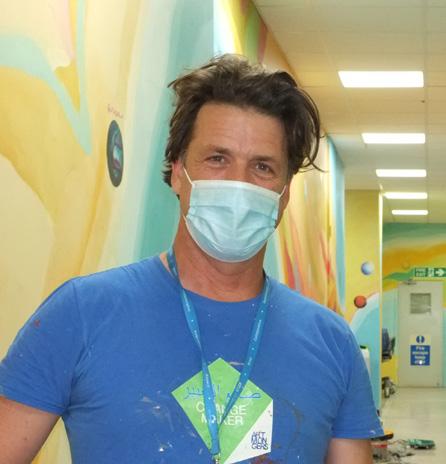
The collaborative project, painted by creative group Artmongers, is based on one-to-one discussions with staff working in the department, bringing a peaceful and personalised atmosphere to the area.

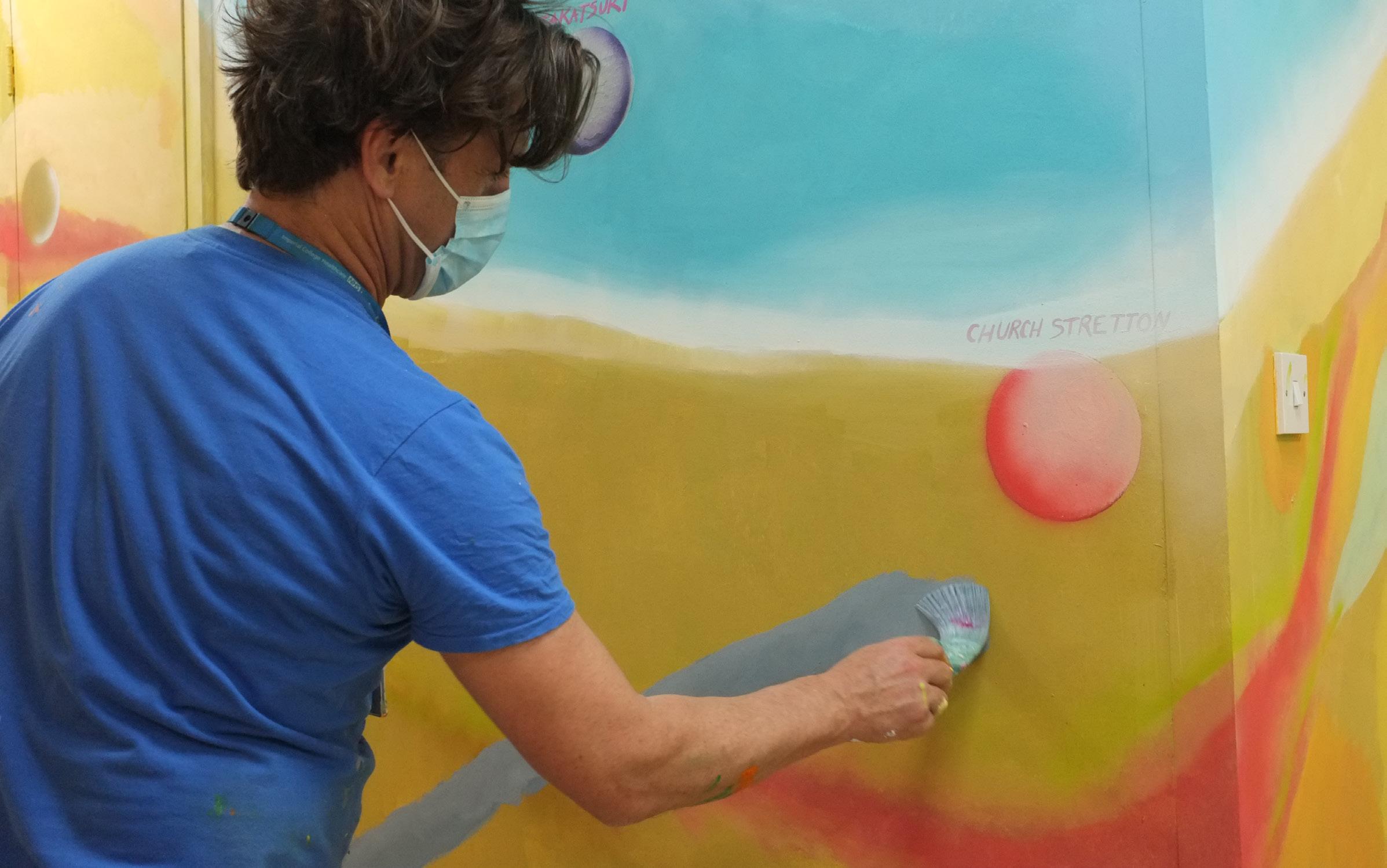
With funding and support from our wider arts programme, Artmongers created the vibrant, topographical mural in spring 2021. It covers an entire corridor, featuring coastlines, mountains and forests, with scattered bubbles depicting memories staff have of their home towns.
The piece celebrates the diversity of the A&E team, with depictions of scenes from around the world - including Chandor, Cape Town and even the Hammersmith Bridge, just a short walk from the hospital. The mural has served as a unique opportunity for staff to reflect on their own heritage and spend time getting to know their colleagues.
“The A&E corridor is a very functional place and we wanted to turn it into an emotional one - a place where staff are going to feel a little bit of longing for where they come from. The feeling is something very personal.”
Patricio Forrester Director, ArtmongersWorking in partnership with our NHS colleagues, we are committed to driving forward new and innovative ideas that transform the experience of care for patients at the Trust’s hospitals. By enabling NHS staff to think openly, develop new ways of working and implement change, we are helping to keep our hospitals at the cutting edge of healthcare.
Over the last year we have provided funding to support a wide range of innovative projects across the Trust’s hospitals as well as working together with a number of new partners to provide better health and wellbeing for people living in our local communities.
To help us achieve this objective, we said we would:
• establish ourselves as a leading partner at the cutting edge of healthcare
• fund major transformation projects within and beyond the Trust
• build partnerships with key health and third sector organisations to expand the impact our work can have.
In 2021/22, we: awarded one round of funding totalling £744k as part of our Innovate at Imperial grants programme
worked in partnership with Imperial College Healthcare to deliver a new funding programme, Compassionate Communities, extending vital support to community-led health and wellbeing initiatives
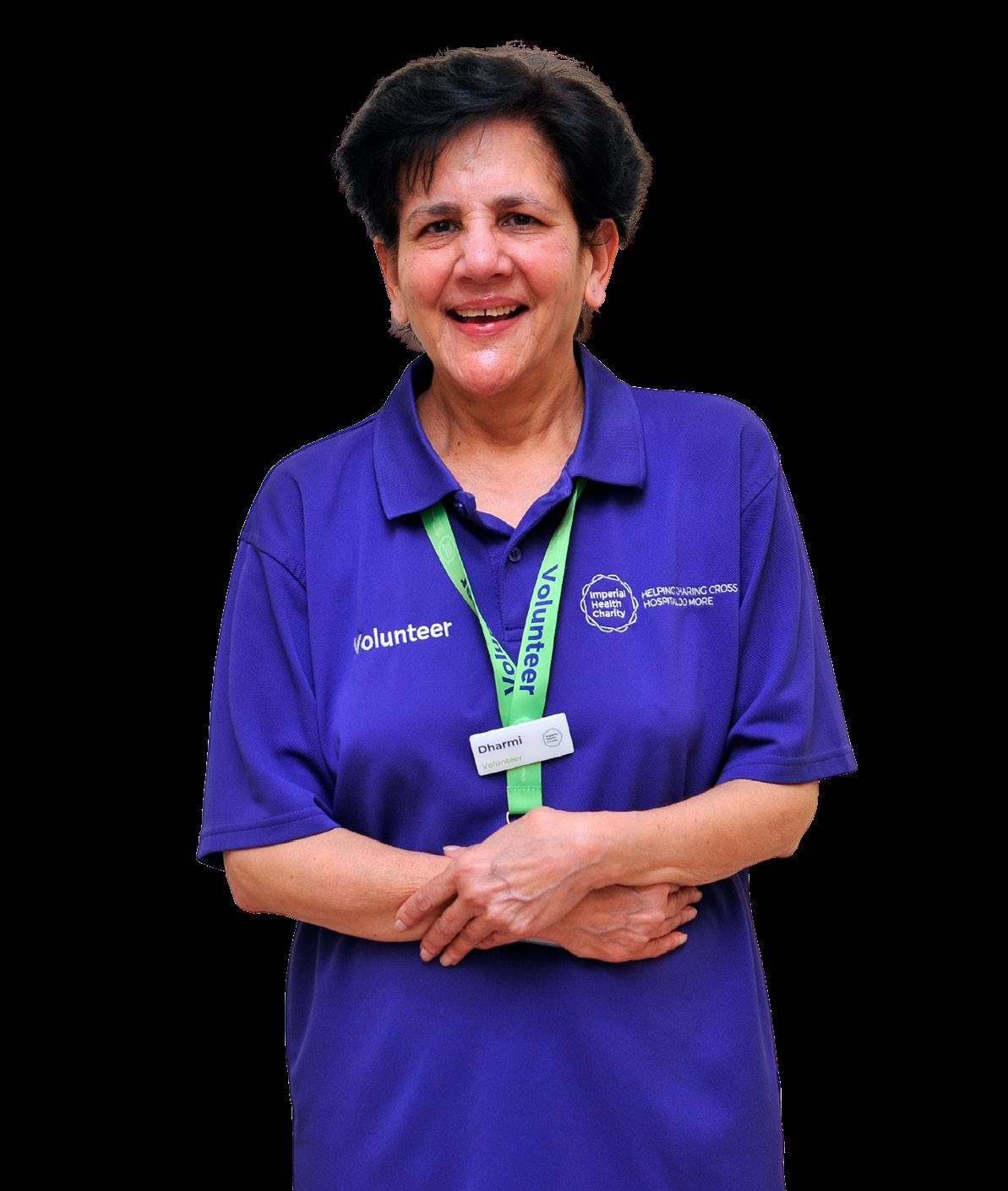
• established a new partnership with the Parasol Foundation, creating the Parasol Foundation Centre for Women's Health and Cancer Research, to open up new opportunities for women in science and healthcare, and accelerate research into ovarian cancer and pre-term birth.
During the year we supported a number of pioneering innovation projects to help improve the quality of care provided for patients in our hospitals, including the rollout of new virtual reality headsets for patients undergoing procedures following a miscarriage. We continued to fund a range of initiatives through our Innovate at Imperial programme, opening up new opportunities for staff to design and develop improvement projects for their ward, department or service.
Delivering our Compassionate Communities demonstrated a new emphasis on working in partnership with the Trust to have a positive impact on the health and wellbeing of the local population of north west London beyond the hospital walls. Following the end of the funding round in spring 2022, we plan to review and evaluate the programme to inform the development of a future place-based funding initiative in 2023/24.
We were also pleased to begin a new partnership with the Parasol Foundation, driving forward vital research into ovarian cancer and pre-term birth.
A new research centre developed in partnership with the Parasol Foundation will empower female researchers to play a leading role in advancing treatments for women's cancers and pre-term birth.
In March 2022 we established the Parasol Foundation Centre for Women's Health and Cancer Research - generously funded by a significant donation from Ms Ruth Monicka Parasol and the Parasol Foundation.
As well as driving forward enhanced care and treatment for women's cancers and further research into the health impacts of pre-term birth, the project will include a key focus on helping female researchers progress their careers in science and healthcare.
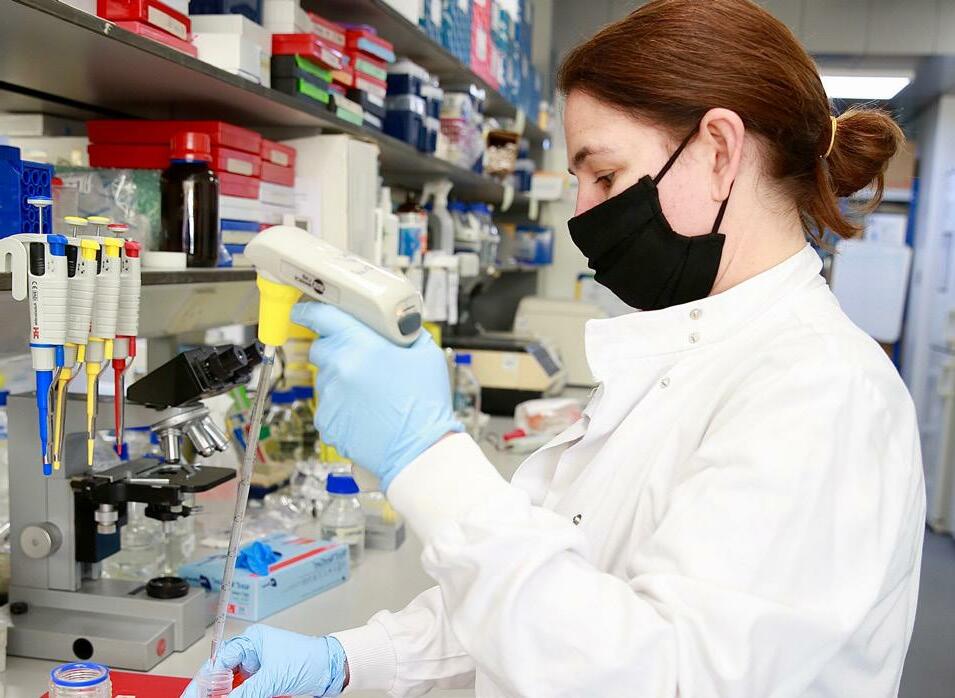
Based at Imperial College Healthcare, the centre's programme of research will take place across facilities at Hammersmith Hospital and St Mary's Hospital, including a series of research fellowship grants that will be awarded to help women lead this vital work.
182surgeries per year to benefit from equipment funded through the Parasol Foundation Centre for Women's Health and Cancer Research
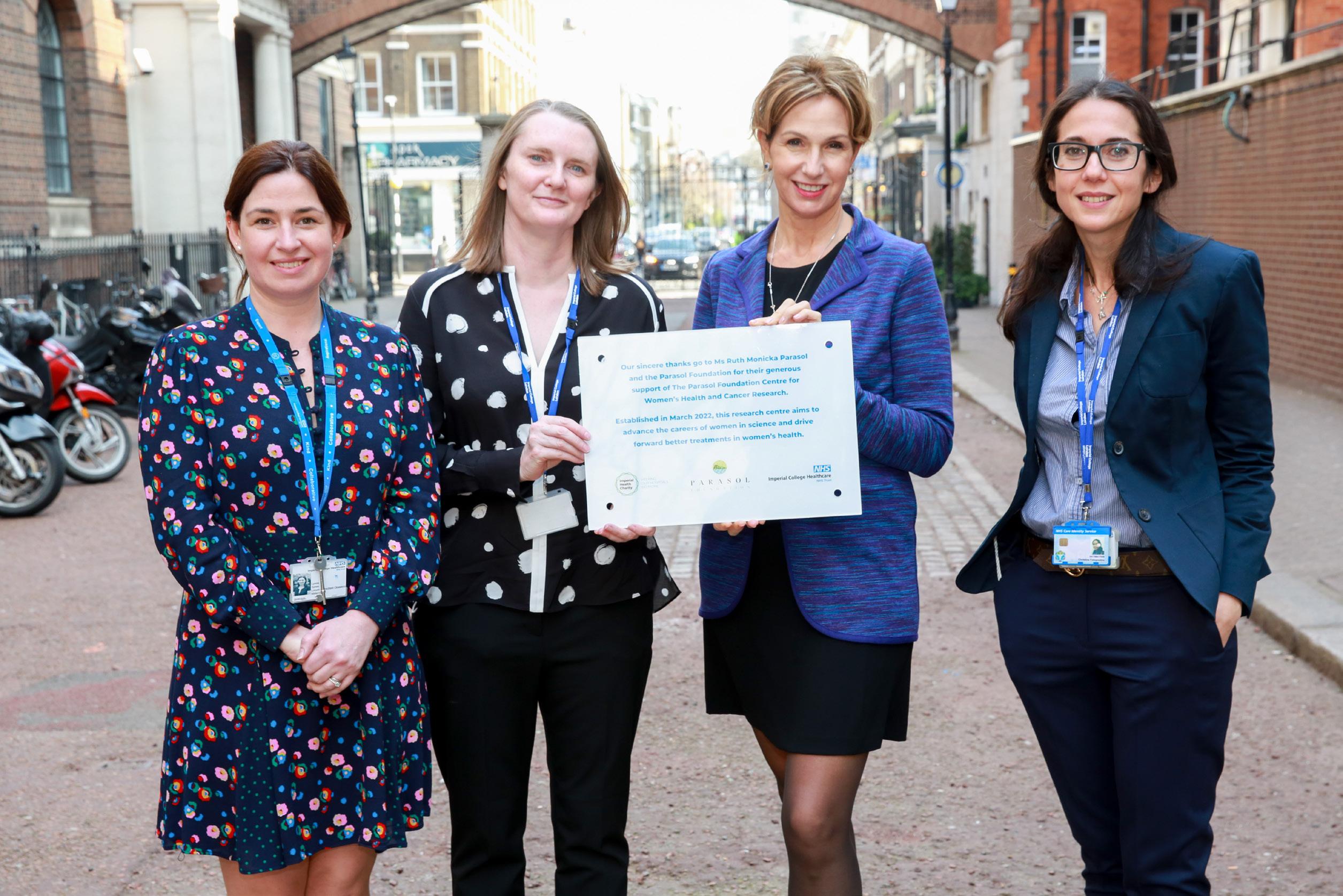 ABOVE: Ms Ruth Parasol (centre right) launches the new centre alongside research staff at St Mary's Hospital.
ABOVE: Ms Ruth Parasol (centre right) launches the new centre alongside research staff at St Mary's Hospital.
“This new centre marks a major milestone for the Trust and a significant moment in our efforts to learn more about lifethreatening women's cancers.”
Professor Katie Urch, Divisional Director for Surgery, Cardiovascular and Cancer
Throughout the pandemic it's been critical for clinical staff to minimise the risk of spreading Covid-19 within our hospitals - to protect patients and themselves from infection.
Ear, Nose and Throat (ENT) surgeons have been particularly vulnerable to the virus when carrying out tracheostomy procedures, which involve inserting a tube into a patient's windpipe to aid with breathing.
Thanks to our funding, a team of clinicians has teamed up with engineering experts at Mercedes F1 to tackle this urgent problem.
Their idea is to place a transparent shield between surgeon and patient during the procedure. The device captures and destroys virus particles before they can spread and contaminate the theatre, providing better protection for staff while moving patients with Covid-19 through intensive care as quickly as possible.
The team at Charing Cross Hospital, led by Professor Guri Sandhu and ENT surgeon Catherine Rennie, have developed a prototype of the device - known as the 'Boreas shield'. Once the shield has been tested and modified by Mercedes, the team hope it can be massproduced and made available to hospitals across the UK.
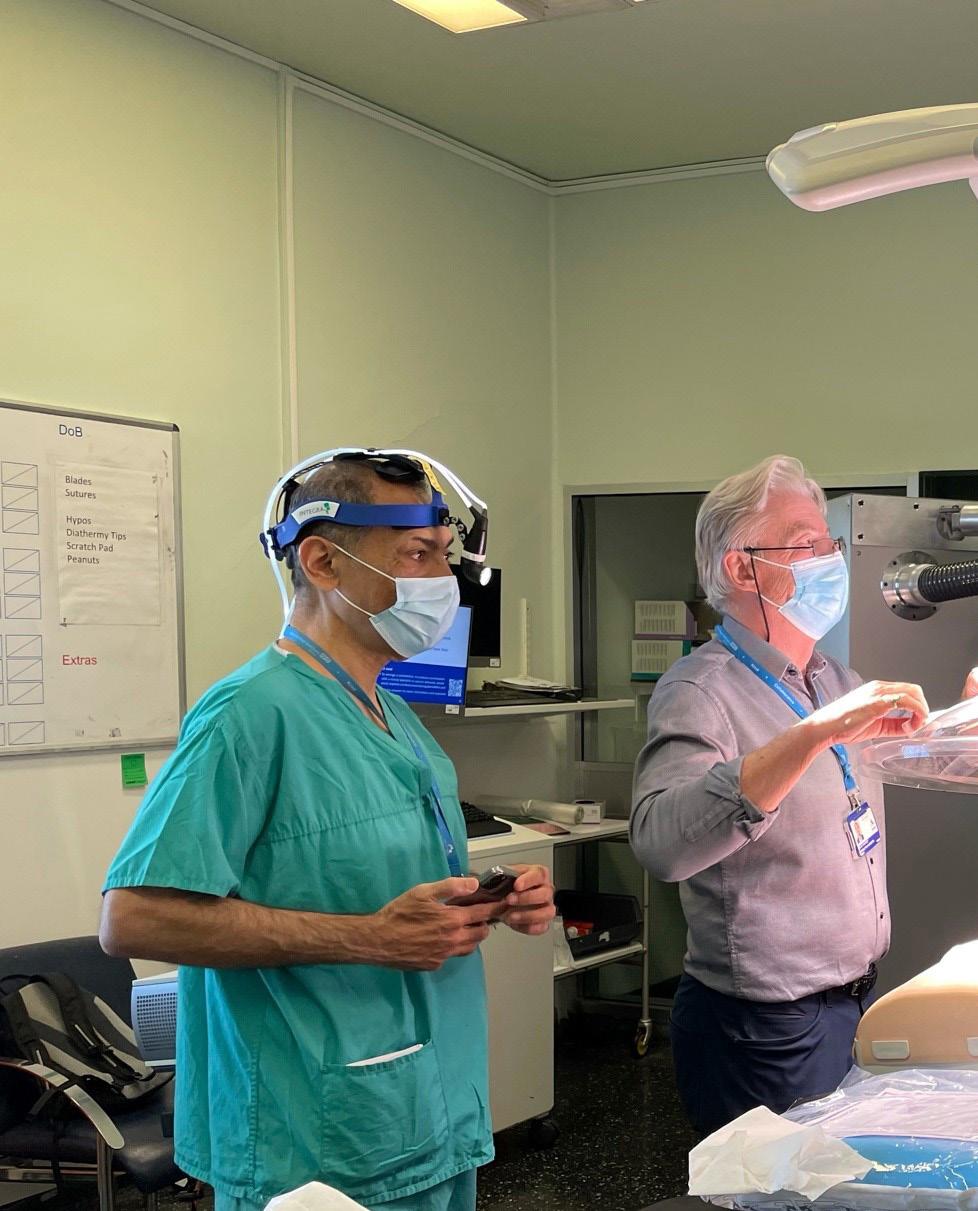
We awarded the team a grant through our Innovate at Imperial funding programme, which aims to help teams across the Trust's hospitals explore new and improved ways of providing patient care.
During the year we awarded 11 Innovate at Imperial grants, investing over £740k in pioneering new projects.
"We would never have been able to make a prototype and test the design concept without the charity's support," said Catherine.
"It's really difficult to find funding for start-up projects like this, so we're phenomenally lucky to have this grant."
Total charity funding awarded to Innovate at Imperial grantees, 2019-22
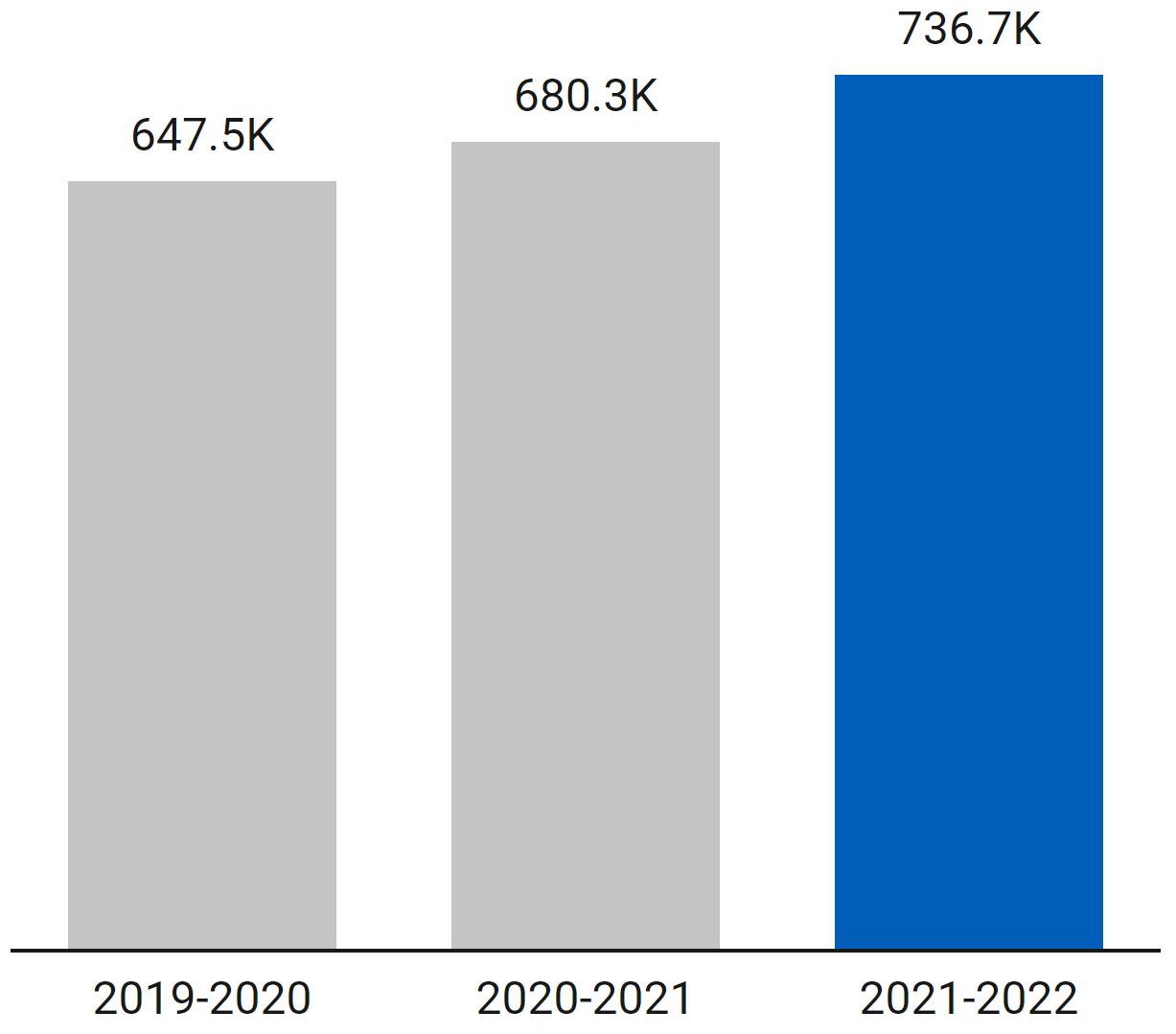
“We would never have been able to make a prototype and test the design concept without the charity's support. We're phenomenally lucky to have this grant.”
Catherine Rennie ENT surgeon at Charing Cross HospitalFor many people who catch Covid-19, the impact can be felt for weeks and months to come. While most patients make a speedy recovery, 'Long Covid' can persist for others, who experience symptoms such as fatigue, shortness of breath and aches. With our funding, a team at the Trust is developing a new app to help patients recovering from Covid-19 manage their health more effectively. The software will provide guidance on exercise and lifestyle changes to help patients selfmanage their recovery.
Some of the most seriously ill patients are looked after in intensive care units, and their journey to recovery can be long and challenging. To aid this process, the Trust's therapies team are making use of our funding to set up a virtual clinic for patients who are discharged from the ICU. An earlier pilot clinic created in 2020 was highly rated by staff and patients and highlighted the need for the service to be offered long-term.
Patients who have experienced a miscarriage can now make use of virtual reality headsets to help provide a distraction during uncomfortable medical procedures, thanks to our funding.

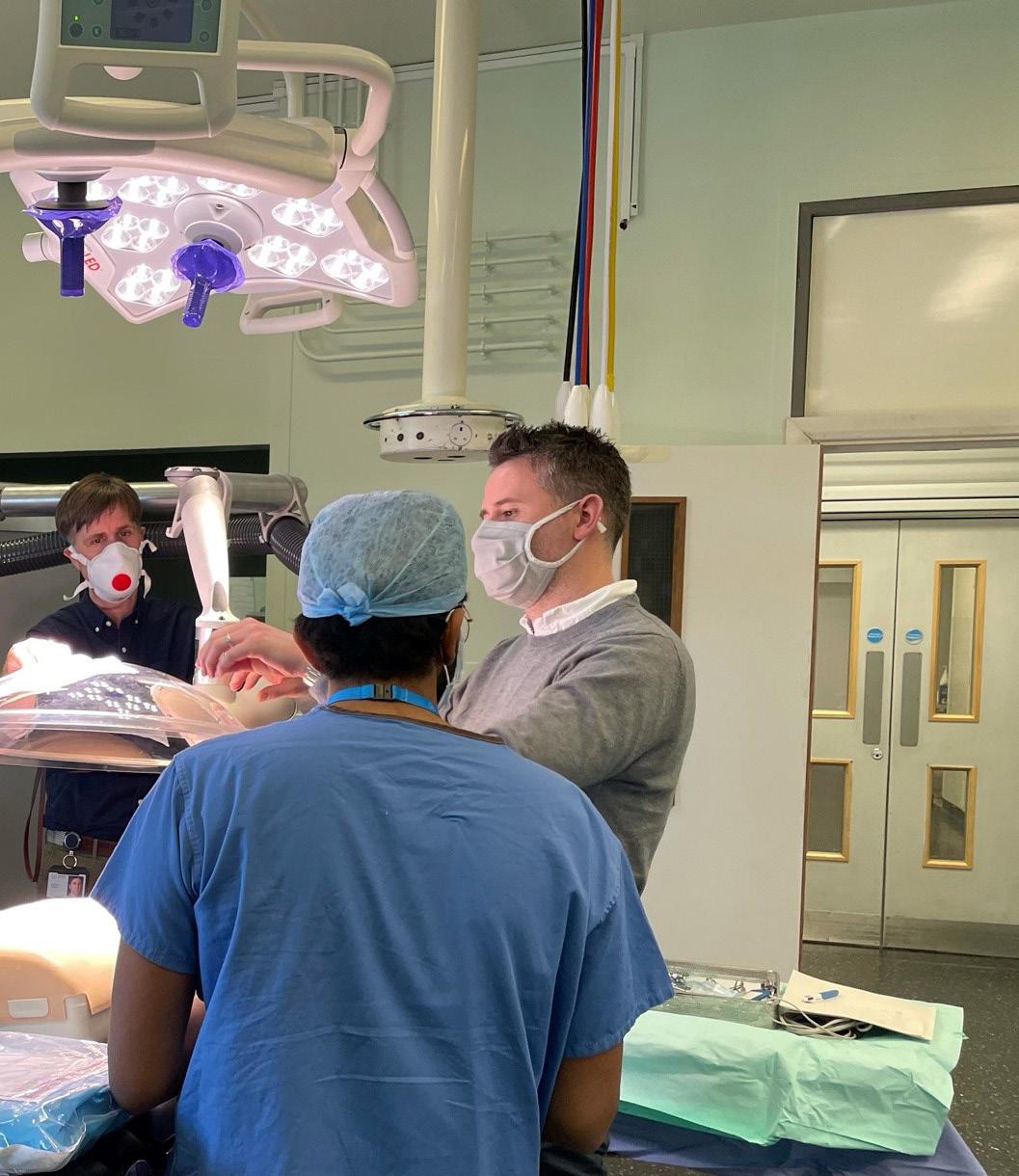
After a miscarraige, many patients undergo a procedure to remove the pregnancy tissue from the womb, which can be phsyically uncomfortable and emotionally distressing at an already difficult time.
Our funding has enabled NHS staff to purchase two virtual reality headsets loaded with calming virtual experiences, such as hiking through nature, which minimise any further trauma for the patient.
A recent study has shown that almost one in three women develop post-traumatic stress disorder after early pregnancy loss, with a quarter experiencing anxiety.
Thanks to our support, staff expect that nearly 400 patients a year will benefit from using the headsets, which will be available at three of our hospital sites - Hammersmith, Queen Charlotte's & Chelsea, and St Mary's.
Image from BBC News available at bbc.co.uk/news
ABOVE: Professor David Howard and the team at Charing Cross test the Boreas shield.During the year we developed our new longterm strategy, setting goals and providing a framework for the next three years. In building the strategy, we reflected on our knowledge, experience and expertise across the organisation, seeking to build upon our existing strengths to focus on areas of activity where we believe we can make a significant impact.
Based on our strong relationship with Imperial College Healthcare NHS Trust and the recent success of our established charitable activities, this new strategy seeks to expand and enhance our current support, enabling us to use our resources to make a real difference to people in north west London and further afield. It also sets out our ambition to work more collaboratively with other healthcare partners in our local communities so that we can help to address some of the most pressing health challenges we face, including the significant inequalities in our society that create barriers to better health.
We carried out several phases of consultation to help us develop the strategy during the year, including discussions with our trustees, meetings with members of the Trust's senior executive team, divisional directors and operational leads, and a series of workshops with our internal staff team.
To help us provide a clear and coherent picture of our ambitions, we have developed two short statements.
Our vision statement is a snapshot of the future, articulating the 'world we want to see' as a result of the impact we make. Our mission statement is a roadmap to success, outlining the approach we will take to bring about this change.
Exceptional care and better health, within our hospitals and in our communities, above and beyond what the NHS alone can provide.
To work together with the Trust and other partners to enhance the experience of care throughout the patient journey, acting as a catalyst to support better health outcomes in our hospitals and in the wider community.
Underpinning our vision and mission, we have identified three strategic objectives. These goals emerged as recurring themes during our consultation and represent the principal aims we will work to achieve over the next three years.
1. Enhance patient experience throughout the care and treatment journey
2. Expand the Trust's capacity to provide outstanding care and improve health outcomes
3. Support better health and wellbeing for patients in our surrounding communities
At an operational level, we will select and organise specific activities to help us achieve our three objectives by 2025. This will include a combination of existing activities alongside several new or adapted ones. These activities have been organised into four key activity 'pillars':
A.
To drive forward improvements to patient care - in our hospitals and in our communities.
B. Population health
To support the Trust's role in the community by providing programmes and services that seek to address established health inequalities.
C.
To invest further in innovation to support transformative projects aligned with the Trust's strategic priorities.
To support the mental health, morale and general wellbeing of NHS staff at the Trust.

strategy, 2022-25:

Objective 1
Enhance patient experience throughout the care and treatment journey


Exceptional care and better health, within our hospitals and in our communuties, above and beyond what the NHS alone can provide.
Objective 2 Expand the Trust's capacity to provide outstanding care and improve health outcomes
Objective 3 Support health and wellbeing for patients in our surrounding communities
Patient care Drive forward improvements to patient care - in our hospitals and communities
Population health
Enhance the Trust's role as an anchor institution by addressing health inequalities
Service transformation
Enable transformative innovation projects aligned with the Trust's priorities

NHS staff wellbeing
Support the mental health, morale and general wellbeing of NHS staff

To ensure we realise our ambitions over the next three years, we will need to create the right internal conditions to set ourselves up for success. In addition to the initiatives outlined above, we have identified four ‘enabler’ factors that must be managed effectively to ensure we are fully equipped to deliver our objectives.
We will introduce a new financial strategy to ensure a sustainable long-term approach to managing our finances. To fund our additional activities, we will set voluntary income targets on an annual basis and aim to achieve a balanced budget each year.

We will work in partnership with the Trust to plan and deliver support effectively within the hospitals and in community settings, as well as working closely with other NHS charities and community partners to maximise impact.

Having a strong visible presence – and effective relationships with our supporters –will strengthen our fundraising efforts, attract more volunteers and help us connect with arts and funding partners. Measuring and evaluating our impact will also be key to our success.
Over the next three years we will continue to invest in our staff, creating opportunities for their personal and professional development to make sure they are equipped to succeed within and beyond their roles.
To help us track progress against our strategic objectives, we have developed an evaluation methodology and framework. Over the course of the strategy period we will regularly monitor and review what we have achieved and where we may need to improve.
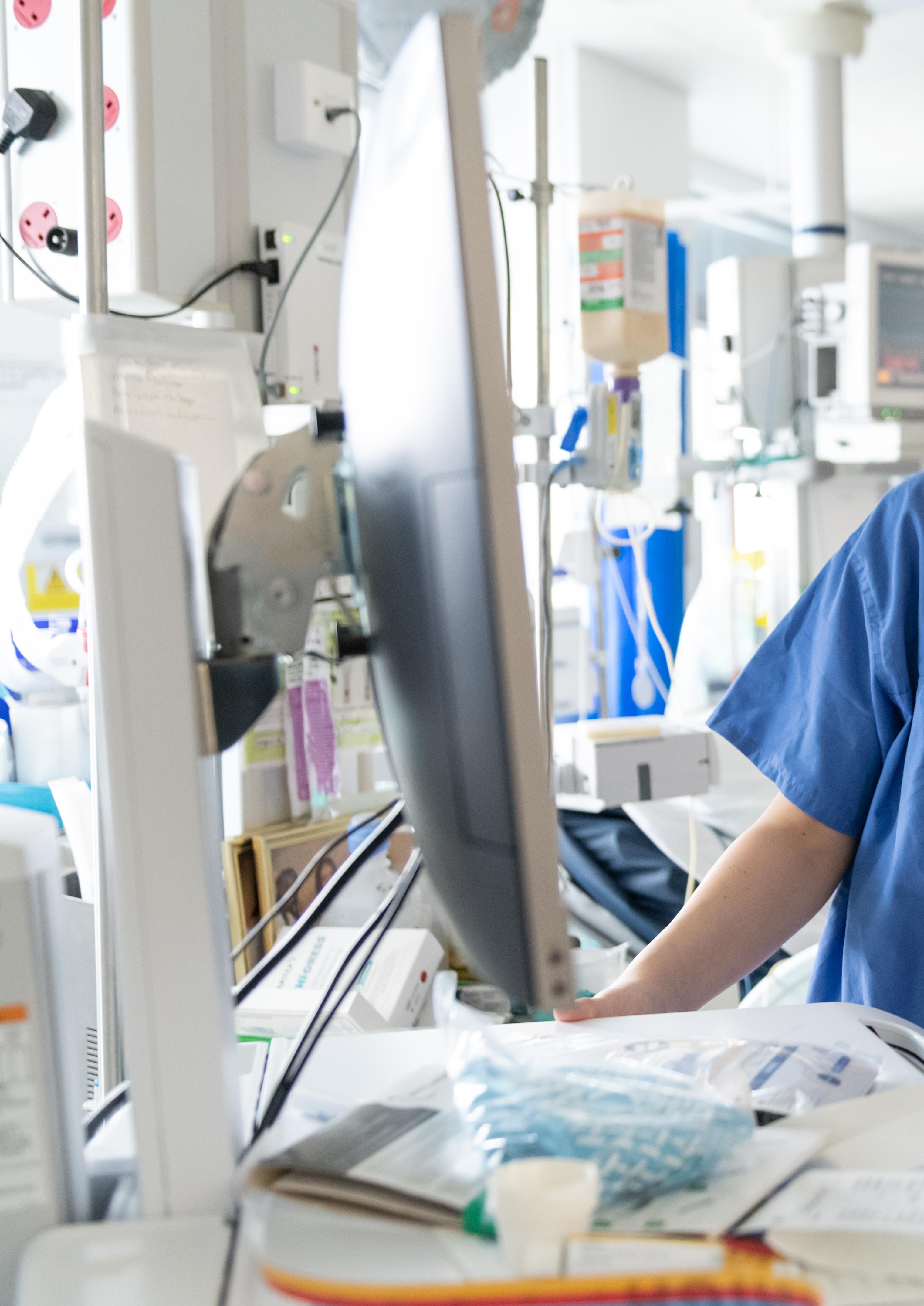

Good governance is essential to our continued success and enables us to manage our risks appropriately, cultivate a positive working environment and culture for our people, and deliver our charitable activities in compliance with all relevant legislation.
Imperial Health Charity is an independent charity and a charitable company limited by guarantee. It is registered with Companies House and with the Charity Commission for England and Wales. The charity was registered as a UK charity on 1 April 2016 (no. 1166084) and as a Charitable Company on 11 February 2016 (no. 9999900). The charity’s governing document is its Memorandum and Articles of Association.
The objects of Imperial Health Charity are restricted specifically to:
• any charitable purpose or purposes relating to the National Health Service or for the general or specific purposes of the Imperial College Healthcare NHS Trust; and
• the relief of sickness and preservation of health of people living in the UK for the public benefit.
Although we are independent of Imperial College Healthcare NHS Trust, our work focuses on enhancing and improving the quality of patient care beyond that which can be achieved by routine NHS funding and on health initiatives for the wider community.

Our work also includes focusing on opportunities to boost income through fundraising, enabling further support for our charitable activities within and beyond the Trust’s hospitals.
Our Board of Trustees is legally responsible for the governance, strategic planning and leadership of the charity. At the end of the year the board comprised nine trustees: six independent members and three representing Imperial College Healthcare NHS Trust. Under the Memorandum and Articles of Association, the chair must be one of the independent members.
We provide public benefit by helping to improve the quality of care and hospital experience for patients at the five hospitals of Imperial College Healthcare NHS Trust and in the wider community of north west London. In reviewing our aims and objectives and planning future activities, our trustees have taken into account the Charity Commission’s general guidance on public benefit and always ensure that our activities are in line with our charitable purpose and objects.
Trustees receive no payment for exercising their roles, but reasonable out-of-pocket expenses are paid. Trustees are sole members of the company with a guarantee of £1.
Vacancies for independent trustees are advertised in the charity sector and health sector media, on our website and within the Trust’s hospitals. Suitable candidates are interviewed by a selection panel and nominations to serve as representatives of the Trust are put forward for consideration by the board.

A formal induction programme is provided for new trustees, including an information pack containing our governing document, the most recent Annual Report & Accounts, budgets, policies and minutes. All trustees are invited to attend seminars and conferences on topics relevant to their roles during their term of office.
Each trustee undertakes an individual appraisal with the chair as part of the wider board review. The objective of the appraisal process is to review each trustee’s individual contribution as well as the performance of the board as a whole.
The board meets four times a year to review activities. A number of committees have been established to assist the board in exercising its obligations:
Arts Committee (oversees arts strategy and activities)
• Development Committee (oversees, supports and drives income generation through fundraising)
• Finance Committee (oversees financial strategy, investments, audit and risk)
• Grants Oversight Committee (oversees main grant-making activities and reviews major grant applications)
• Research Fellowships Committee (oversees the review and award of the annual research fellowship grants)
The board appoints a chief executive who is responsible for the implementation of the board’s strategy and day-to-day running of the charity’s activities, policies and procedures.

The Grants Oversight Committee and Research Fellowships Committee are responsible for the majority of our grantmaking activities. This involves implementing grant-making strategies and reviewing significant grant applications. Some smaller grant applications may be considered and approved by the Chief Executive and/or Head of Grants where appropriate.
Further expenditure is managed by selected members of staff at Imperial College Healthcare NHS Trust – known as fund advisers – under delegated authority from the trustees. For more information about special purpose funds, please turn to p21.

The current members of our Board of Trustees are:
Independent David Crundwell (Chair)
Caroline Lien (Deputy Chair)
Kevin Bone
Dr Anita Donley OBE
Babs Evans
Dr Sandra Husbands Tingting Peng
Representing Imperial College Healthcare NHS Trust
Michelle Dixon (Director of Communications)
Prof Julian Redhead (Medical Director) Nick Ross CBE (Non-Executive Director)
The following trustees also served during the year:
Robert Creighton (retired 31 March 2022) Ngozi Erondu (resigned 31 March 2022) Valerie Jolliffe (retired 31 March 2022)
The senior management team is responsible for the day-to-day leadership of the charity, the management of our staff and volunteers, the delivery of our strategy and adherence to our policies and procedures.
The current members of our senior management team are:
Chief Executive Ian Lush OBE
Director of Development Hayley Pannick
Director of Finance Andrew Kaponi
Head of Arts Lucy Zacaria
Head of Communications Jack Dixon
Head of Grants Francesca Ferro
Head of Office Louise Stephens
ABOVE: New parents receive care at Queen Charlotte's & Chelsea.Head of Volunteering
Chris Neal (appointed June 2022)
The following personnel also served on our senior management team during the year:
Sam Morris, Head of Volunteering (resigned June 2022)
Our approach to remuneration is led by reward principles in paying to attract and retain staff who can deliver effectively in a positive working environment. We take into account external benchmarking, the charity sector and industry as a whole, as well as our overall financial performance, and reference CPI and reward trends. The Board of Trustees considers the remuneration on an annual basis.
We work with external consultants to monitor and maintain our pay and grading structure, and ensure this remains based on principles of fairness, transparency and affordability, while maintaining budgetary control. Pay and grading comprises an eight-band pay structure - each band with a pay range covering five levels. Progression through the bands is determined by length of service.
Banking, investment and auditors Bank
National Westminster Bank First Floor, Natwest Bank PO Box 2A 69 Baker Street London, W1U 6AT
Investment
UBS AG Wealth Management 5 Broadgate London, EC2M 2AN
Moore Kingston Smith LLP 6th Floor
9 Appold Street London EC2A 2AP
The trust and confidence of our supporters is very important to us. It is only thanks to their generosity that we can continue to help our hospitals do more and we value each and every contribution to our fundraising efforts.
To each of our supporters, we pledge the following. We will:
• follow all recognised codes of fundraising practice and other guidelines that prescribe best practice fundraising standard for the UK charity sector (we are registered with the Fundraising Regulator and comply with all UK charity laws and regulations)
• ensure the way in which we communicate with our supporters is considerate and reasonable
• never sell our supporters’ personal information or share them with another organisation
• be transparent in making clear how our supporters’ money is spent through our website, newsletters and in our publicly available audited accounts
acknowledge and thank supporters for their donations as a sign of our appreciation
respond to any complaints in a timely and respectful fashion
• take special care in our contact with supporters who may be vulnerable.
During the year we received one complaint related to our fundraising activities.
We believe that nobody – either our people or the people we support –should ever experience abuse of any kind, regardless of age, disability, gender, race, religious belief, sexual orientation or identity. This includes but is not limited to neglect, physical, sexual and emotional abuse. We communicate these principles to our staff,
ANNUAL REPORT AND ACCOUNTS, 2021/22
volunteers and partner organisations by issuing a pocket-sized code of behaviour document – ‘the green card’ – which includes a list of behaviours that we expect them to follow. The card also includes advice on safeguarding. Staff and volunteers are expected to carry their ‘green card’ with them at all times. Our people are encouraged to report any concerns relating to breaches of the code and/or the safety and welfare of people with whom they come into contact when representing us.
We are committed to promoting equality of opportunity for all our staff and those who apply to join our team. We aim to create a working environment in which everyone is able to make best use of their skills, free from discrimination or harassment, and in which all decisions are based on merit.
We don’t discriminate against staff or job applicants on the basis of age, disability, gender reassignment, marital or civil partner status, pregnancy or maternity, race, colour, nationality, ethnic or national origin, religion or belief, sex or sexual orientation.
The principles of non-discrimination and equality of opportunity also apply to the way in which staff treat visitors, clients, customers, suppliers, former staff members and the public.
We are committed to valuing the contribution of a diverse workforce and providing outstanding services to meet the needs of stakeholders and individuals in line with our equal opportunities policy. We provide support to members of staff through learning and development opportunities so that they can participate fully in the workforce. Our staff are also given appropriate access to training to enable them to progress within the organisation and all promotion decisions are made on the basis of merit.
In order to help us create a culture of inclusion, we have participated in a programme of work to provide additional equality, diversity and inclusion training for our senior management team and all
line managers, with all other staff given the opportunity to participate. During the year we also established an internal Safe Support Network, providing an opportunity for staff with one or more protected characteristics to share their experiences and contribute ideas to related initiatives.
During the year Imperial College Healthcare NHS Trust launched its 'green plan' - a longterm programme of activity setting out how the organisation will reduce the impact of climate change and pollution on health, reduce its reliance on unsustainable services and medicines, and embrace 'green' learning and innovation. The plan is underpinned by 12 'green goals' for the Trust, including achieving cleaner air, reducing energy use and facilitating smarter travel.
As the Trust's charity partner, we are committed to supporting its long-term strategic ambitions and recognise the importance of a responsible approach to our own activities in order to minimise the environmental impact of our work.
During the year we initiated an eco-audit process with an external consultant to help us better understand our current environmental impact, develop a framework of relevant actions to mitigate the impact, and deliver a programme of training and education sessions to help our staff implement meaningful changes in their day-to-day work.
This work is due to be completed during the 2022/23 year.
We are committed to ensuring the privacy of our staff, supporters, volunteers and partners is protected. When we collect personal information, we commit to keeping this information safe.
In accordance with the Data Protection Act 2018, our privacy statement sets out how we collect and use personal information, and why this is important in enabling us to fulfil our charitable objectives. Our privacy statement is available in full on our website.
We are committed to the safeguarding and protection of children and adults at risk in our work and will do everything possible to ensure that only those who are suitable to work with these vulnerable groups are recruited to work for us. Mandatory safeguarding training is required of all our staff and volunteers and we have designated members of staff as safeguarding lead and deputy lead. We also carry out safer recruitment practices when appointing staff and volunteers to roles.
We aim to develop an instantly recognisable community of volunteers who are visibly making a positive difference to the experience of patients, visitors and staff at the Trust’s hospitals. We want volunteers to feel valued and well supported as part of the team and to truly live our values in their roles.
We want staff to be able to understand, work with and support volunteers to help them make a difference for patients. At our core we believe that the role of a volunteer within the NHS environment is to add value to the work of paid professionals, not to replace jobs, cover gaps or cut costs.

commitment to managing a high-quality volunteering programme and the methods through which we will do this, to ensure that both volunteers and our hospitals benefit from the experience. The policy is available to read in full on our website.
We aim to create a workplace culture that promotes and supports the health and wellbeing of all our staff. This involves addressing and tackling factors that may have a negative impact on mental health, ensuring managers have the right skills to support staff, providing support and guidance for any staff member experiencing mental health issues and recognising that workplace stress is a health and safety issue.
Effective risk management is fundamental in enabling us to deliver our strategy and ensure the charity remains strong and sustainable in the long term. With the support of our committees and senior management team, the trustees consider significant strategic and operational risks on an ongoing basis. We have a robust process in place to help us identify and manage the principal risks we face, and the trustees are satisfied that appropriate systems and procedures are in place to mitigate and manage these risks.
Our prinicipal risks and their key mitigations are:
• Covid-19
The Covid-19 pandemic remains a risk to the charity. While societal restrictions were gradually eased during the year, strict Covid-19 safety measures remained in place in the Trust's hospitals, limiting access for visitors and non-essential staff.
Some of our normal charitable activities continued to be disrupted for most of the year and we planned alternative ways to deliver our grants, arts and volunteering programmes for the benefit of patients and NHS staff. This included postponing certain volunteer roles and providing arts activities for patients remotely. We continue to work with the Trust to identify opportunities to reintroduce volunteers into more traditional, ward-based roles and restore in-person arts activities as restrictions in clinical areas gradually ease.
Although we have faced a challenging fundraising climate over the past two years, we have taken on board significant learning and implemented a range of alternative fundraising activities, including virtual and online events. We anticipate being able to deliver a mix of in-person and virtual fundraising events next year.
We remain in a strong financial position to weather the impact of any further Covid-19 waves and have taken steps to implement a hybrid working policy so that our staff can work remotely as necessary. In conjunction with the senior management team, the trustees continue to monitor the situation on an ongoing basis with a primary focus on ensuring that we are able to continue
delivering our charitable activities in line with our strategic objectives.
In order to continue our charitable activities, we are reliant on our two main sources of income: investment returns and fundraised income. Failure to meet our targets for either or both of these presents a significant risk.
Ongoing instability in the economy and investment market will have a significant impact on our investment capital value and investment income. We have acted quickly to benefit from higher interest rates and remain in regular dialogue with our investment managers. We are also reviewing our relationshipw with our investment managers with the intention to move towards more ethical investments that support our charitable mission. We anticipate being able to absorb adverse investment market movements through a combination of healthy general reserves and astute financial stewardship.
The impact of the ongoing cost of living crisis on household budgets is likely to lead to a drop in indvidual giving during the year ahead, which will result in greater competition to secure funds from grantmakers, philanthropists and corporate supporters. Our income from community and events fundraising is also likely to be affected during the year ahead and we have developed alternative plans to generate additional income, including enhancing our promotional activities within the hospitals.
Given the nature of our work, reputational risks may arise from our fundraising and grant-making activities, or our arts and volunteering programmes. Plans are in place to mitigate these risks as far as reasonably possible. To avoid inappropriate or unethical use of charitable funds, all grant applications are scrutinised for ethical issues. In certain circumstances, charitable funds are disseminated in accordance with a donor’s specific wishes, within reason, or the stated aims of a particular campaign or fund. In addition, we are registered with the Fundraising Regulator and adhere to its code
of conduct. We also have our own ethical fundraising policy and do not use external agencies for any of our fundraising activities. The trustees have oversight of charitable spending and scrutinise grant awards. Additional responsibility is delegated to the Grants Oversight Committee. The artworks we acquire and commission are approved by members of NHS staff and external experts through our Arts Committee.
Our IT support is outsourced to a national provider, which is ISO27001 accredited, and our cloud-based databases are stored off-site by a software provider, which is also ISO27001 accredited. In accordance with the Data Protection Act 2018, our privacy statement sets out how we collect and use personal information. Our staff receive appropriate training and information regarding data protection procedures on an ongoing basis and all reasonable steps are taken to protect the security of personal information. During 2022/23 we will be undertaking work with a new IT support provider to help us guard against cyber security threats by achieving the National Cyber Security Centre's 'Cyber Essentials' certification.
Responsibility for the day-to-day management of certain funds is delegated to designated fund advisers, meaning that decisions regarding a proportion of our funds are managed by NHS staff outside our direct control. Only senior members of NHS staff with an appropriate level of responsibility in a relevant service are approved as fund advisers and all expenditure is checked against the stated purposes of the relevant fund before awards are approved. Goods and services are usually procured through the Trust’s procurement system to ensure value for money and compliance with relevant policies. A programme of work to engage and support fund advisers has progressed during the last year with plans in place to develop these activities further in 2022/23.
Health and safety risks to staff and volunteers
The realities of managing our activities within the context of the pandemic has presented risks related to the health, safety and wellbeing of our staff and volunteers. Over the last two years we have acted with caution and care to minimise the risk to individuals while ensuring our activities can continue.
During 2021/22 we transitioned from full remote working at the beginning of the year to a hybrid working approach on a trial basis. We have provided appropriate support to allow staff to work remotely and engaged in a consultation process with staff before implementing the changes. A core group of volunteering department staff continue to work from the hospital sites in order to coordinate volunteering activities.
Individual risk assessments have been undertaken to mitigate the risk of our staff and volunteers becoming infected with or spreading the virus, and our internal Covid-19 guidance has been updated throughout the year to ensure staff are familiar with the latest advice.
Recognising the highly unusual and challenging working conditions for staff living in isolation and working remotely for long periods of time, we also continued to provide significant additional mental health and wellbeing support through a working group comprising staff from across the charity.
Due to the location of our premises in central London and following a number of terrorrelated incidents in recent years, we continue to recognise the enhanced risk this poses to the safety and wellbeing of our staff and volunteers, as well as our ability to maintain business operations during a period of significant and unexpected disruption. During the year we reviewed and strengthened our existing policies and procedures in light of this threat and continue to provide comprehensive guidance for staff to follow in the event of a terror-related incident, cyber attack or significant disruption to travel infrastructure in the local area. We also recognise the alarming and distressing nature of such incidents and provide appropriate emotional wellbeing support to our staff and volunteers as required.
ANNUAL REPORT AND ACCOUNTS, 2021/22
The trustees are responsible for preparing the Report of the Trustees and the financial statements in accordance with applicable law and United Kingdom Accounting Standards (United Kingdom Generally Accepted Accounting Practice).
Company law requires the trustees to prepare financial statements for each financial period that give a true and fair view of the state of affairs of the charitable company and of the incoming resources and application of resources, including the income and expenditure of the charitable company for that period.
In preparing those financial statements, the trustees are required to:
• select suitable accounting policies and then apply them consistently
• comply with applicable accounting standards, including FRS 102, subject to any material departures disclosed and explained in the financial statements
• state whether a Statement of Recommended Practice (SORP) applies and has been followed, subject to any material departures which are explained in the financial statements
• make judgements and estimates that are reasonable and prudent
• prepare the financial statements on a going concern basis unless it is inappropriate to presume that the charitable company will continue in business.
The trustees are responsible for keeping proper accounting records, which disclose with reasonable accuracy at any time the financial position of the charitable company and to enable them to ensure that the financial statements comply with the Companies Act 2006.
They are also responsible for safeguarding the assets of the charitable company and hence for taking reasonable steps for the prevention and detection of fraud and other irregularities.
In so far as the trustees are aware:
• there is no relevant audit information of which the charitable company’s auditor is unaware
• the trustees have taken all the steps that they ought to have taken to make themselves aware of any relevant audit information and to establish that the auditor is aware of that information.
The Trustees’ Annual Report is approved by the trustees of the charity.
Approved by the trustees on 28 November 2022 and signed on their behalf by:
Crundwell Chair of TrusteesMoore Kingston Smith LLP were re-appointed as auditors in the year in accordance with the Companies Act 2006.
 David
David
ANNUAL REPORT AND ACCOUNTS, 2021/22


Thanks to the generosity of our supporters and the ongoing efforts of our staff and volunteers, the charity’s financial performance has remained very strong this year despite a challenging economic climate and the aftermath of the Covid-19 pandemic.
During the year we generated income totalling £6.1m and spent £7.7m helping our hospitals do more through our grant-making, arts and volunteering activities.
Following an exceptional year in 2020/21, during which we ran our Covid-19 fundraising appeal and provided a wide range of urgent support for our hospitals, our overall performance in 2021/22 met our expectations at the beginning of the year and our investment gains enabled us to achieve an overall surplus.
These results are presented in further detail in the table below.
Investment gain
Net surplus Reserves at 31 March
2022 2021
£6.1m £7.1m
£9.1m £10.9m £4.3m £15.4m £1.3m £11.6m £92.5m £91.1m
Significant income was generated through philanthropic donations in particular, while income from our investments also increased during this period.
The primary focus of our charitable expenditure remains the award of grants to support healthcare projects for the benefit of patients and NHS staff at Imperial College Healthcare NHS Trust and the wider population of north west London. However, we also invested further in our arts and volunteering activities over the course of the year, enabling us to generate even greater impact for our beneficiaries.
During the year our charitable spending returned to expected levels of expenditure following the unprecedented and exceptional support we provided to the hospitals in 2020/21 in response to the Covid-19 pandemic.
Our total funds increased by £1.3m - from £91.1m to £92.4m - over the course of the year due to our investment gains. This comprises £44.3m in endowment funds, £1.6m in restricted funds and £46.5m in unrestricted funds. After designation, free reserves stood at £33.2m (31 March 2021: £31.6m).
We are reliant on voluntary contributions from our supporters as our principal source of income and without these generous donations we would not be able to sustain our charitable activities. We are therefore extremely grateful to everyone who has generously contributed to support our work during the year.
Income from our Covid-19 fundraising appeal led to an exceptional year in 2020/21. Following the closure of the appeal, we enjoyed another very strong year in 2021/22.
Our investment portfolio has a long-term total return target of CPI +4.5%. There is no separate income target. The trustees rely on specialist advice for fund selection and allocation. The performance of our investment managers and portfolio is monitored by the Finance Committee, a sub-committee of the Board of Trustees. We take care to ensure the investment portfolio is not exposed to investments that may be inconsistent with our mission and objectives. To this end, direct or indirect investment in the tobacco industry is not permitted.
Overall, the portfolio performed well during the year. Investment values have increased by £3.2m in the year, standing at £71.3m (31 March 2021: £68.1m).
Investment income has recovered slightly from 2021 but is still lower than expected. In addition, a cash deposit is held of £6.5m, down £2m from the year before. This is made up of readily available cash where the capital is protected but attracts low interest rates.
The trustees consider a key measure of sustainability to be the maintenance of the real value of the investment portfolio for future generations after disbursing 4.5% return. If we exceed a return of 4.5% this will be used to build income generation for the future.
The portfolio has achieved its goal of a 4.5% return and the trustees have set an appropriate reserves policy relating to liquidity, based on the relationship between liquid assets and cash required to cover grants awarded and to sustain our future operations.
The trustees regard it as essential to consider intergenerational equity, weighing up the needs of current and future beneficiaries. It is therefore prudent for the charity to spend its assets in a controlled way. We regularly review how we monitor and manage the level of reserves held by the charity.
We seek to spend our restricted funds proactively but we may hold onto them for a period of time so they can be allocated in line with the donor’s intentions. In the rare and unlikely event that funds cannot be used in line with the original restriction, we will contact the donor to discuss an alternative use of the funds.
The trustees consider a number of risk factors relevant to the charity that would indicate the need for us to maintain significant levels of reserves. These include:
• the limitations on reliability of voluntary income, and the potential requirement to
fill any shortfall in budgeted income;
• our plans for steady strategic growth, which will require ongoing investment;
• funding commitments that have previously been made to the Trust, which we must be able to fulfil;
• the likelihood of continued demand for charitable support on the part of the Trust and its hospitals;
• the uncertain economic outlook as a result of recent global events.
Taking these factors into consideration, the trustees have agreed the charity should hold reserves to cover the period of the next threeyear strategy (2022-25) in free reserves, which are c£10m pa +CPI (£30m +CPI in total). Free reserves are made up of general funds less tangible fixed assets, and currently stand at £33.2m.
During the year the trustees also approved a new financial strategy, which will seek to achieve a break-even budget based on the previous year’s investment gains using reserves to make up any shortfall.
We have audited the financial statements of Imperial Health Charity (‘the company’) for the year ended 31 March 2022 which comprise the Statement of Financial Activities, the Balance Sheet, the Cash Flow Statement and notes to the financial statements, including a summary of significant accounting policies. The financial reporting framework that has been applied in their preparation is applicable law and United Kingdom Accounting Standards, including FRS 102 ‘The Financial Reporting Standard Applicable in the UK and Republic of Ireland’ (United Kingdom Generally Accepted Accounting Practice).
In our opinion the financial statements:
• give a true and fair view of the state of the charitable company’s affairs as at 31 March 2022 and of its incoming resources and application of resources, including its income and expenditure, for the year then ended;
• have been properly prepared in accordance with United Kingdom Generally Accepted Accounting Practice; and
• have been prepared in accordance with the requirements of the Companies Act 2006.
We conducted our audit in accordance with International Standards on Auditing (UK) (ISAs(UK)) and applicable law. Our responsibilities under those standards are further described in the Auditor’s Responsibilities for the audit of the financial statements section of our report. We are independent of the charitable company in accordance with the ethical requirements that are relevant to our audit of the financial statements in the UK, including the FRC’s Ethical Standard, and we have fulfilled our
other ethical responsibilities in accordance with these requirements. We believe that the audit evidence we have obtained is sufficient and appropriate to provide a basis for our opinion.
In auditing the financial statements, we have concluded that the trustees’ use of the going concern basis of accounting in the preparation of the financial statements is appropriate.
Based on the work we have performed, we have not identified any material uncertainties relating to events or conditions that, individually or collectively, may cast significant doubt on the charitable company's ability to continue as a going concern for a period of at least twelve months from when the financial statements are authorised for issue.
Our responsibilities and the responsibilities of the trustees with respect to going concern are described in the relevant sections of this report.
The other information comprises the information included in the annual report, other than the financial statements and our auditor’s report thereon. The trustees are responsible for the other information. Our opinion on the financial statements does not cover the other information and, except to the extent otherwise explicitly stated in our report, we do not express any form of assurance conclusion thereon.
In connection with our audit of the financial statements, our responsibility is to read the other information and, in doing so, consider whether the other information is materially inconsistent with the financial statements or our knowledge obtained in the audit or otherwise appears to be materially misstated.
If we identify such material inconsistencies or apparent material misstatements, we
are required to determine whether there is a material misstatement in the financial statements or a material misstatement of the other information. If, based on the work we have performed, we conclude that there is a material misstatement of this other information, we are required to report that fact.
We have nothing to report in this regard.
Opinions on other matters prescribed by the Companies Act 2006
In our opinion, based on the work undertaken in the course of the audit:
• the information given in the trustees’ annual report for the financial year for which the financial statements are prepared is consistent with the financial statements; and
• the trustees’ annual report has been prepared in accordance with applicable legal requirements.
Matters on which we are required to report by exception
In the light of the knowledge and understanding of the company and its environment obtained in the course of the audit, we have not identified material misstatements in the trustees’ annual report.
We have nothing to report in respect of the following matters where the Companies Act 2006 requires us to report to you if, in our opinion:
adequate accounting records have not been kept, or returns adequate for our audit have not been received from branches not visited by us; or
• the financial statements are not in agreement with the accounting records and returns; or
• certain disclosures of trustees’ remuneration specified by law are not made; or
we have not received all the information and explanations we require for our audit; or
• the trustees were not entitled to take advantage of the small companies exemption from preparing a Strategic Report.
As explained more fully in the trustees’ responsibilities statement set out on page 52, the trustees (who are also the directors of the charitable company for the purposes of company law) are responsible for the preparation of the financial statements and for being satisfied that they give a true and fair view, and for such internal control as the trustees determine is necessary to enable the preparation of financial statements that are free from material misstatement, whether due to fraud or error.
In preparing the financial statements, the trustees are responsible for assessing the charitable company’s ability to continue as a going concern, disclosing, as applicable, matters related to going concern and using the going concern basis of accounting unless the trustees either intend to liquidate the charitable company or to cease operations, or have no realistic alternative but to do so.
Our objectives are to obtain reasonable assurance about whether the financial statements as a whole are free from material misstatement, whether due to fraud or error, and to issue an auditor’s report that includes our opinion. Reasonable assurance is a high level of assurance, but is not a guarantee that an audit conducted in accordance with ISAs (UK) will always detect a material misstatement when it exists.
Misstatements can arise from fraud or error and are considered material if, individually or in aggregate, they could reasonably be expected to influence the economic decisions of users taken on the basis of these financial statements.
As part of an audit in accordance with ISAs (UK) we exercise professional judgement and maintain professional scepticism throughout the audit. We also:
• identify and assess the risks of material misstatement of the financial statements, whether due to fraud or error, design and perform audit procedures responsive to those risks, and obtain audit evidence that is sufficient and appropriate to provide a basis for our opinion. The risk of not detecting a material misstatement resulting from fraud is higher than for one resulting from error, as fraud may involve collusion, forgery, intentional omissions, misrepresentations, or the override of internal control.
• obtain an understanding of internal control relevant to the audit in order to design audit procedures that are appropriate in the circumstances, but not for the purposes of expressing an opinion on the effectiveness of the charitable company’s internal control.
• evaluate the appropriateness of accounting policies used and the reasonableness of accounting estimates and related disclosures made by the trustees.
• conclude on the appropriateness of the trustees’ use of the going concern basis of accounting and, based on the audit evidence obtained, whether a material uncertainty exists related to events or conditions that may cast significant doubt on the charitable company’s ability to continue as a going concern. If we conclude that a material uncertainty exists, we are required to draw attention in our auditor’s report to the related disclosures in the financial statements or, if such disclosures are inadequate, to modify our opinion. Our conclusions are based on the audit evidence obtained up to the date of our auditor’s report. However, future events or conditions may cause the charitable company to cease to continue as a going concern.
• evaluate the overall presentation, structure and content of the financial statements, including the disclosures, and whether the financial statements represent the underlying transactions and events in a manner that achieves fair presentation.
We communicate with those charged with governance regarding, among other matters, the planned scope and timing of the audit and significant audit findings, including any
significant deficiencies in internal control that we identify during our audit.
Explanation as to what extent the audit was considered capable of detecting irregularities, including fraud
Irregularities, including fraud, are instances of non-compliance with laws and regulations. We design procedures in line with our responsibilities, outlined above, to detect material misstatements in respect of irregularities, including fraud. The extent to which our procedures are capable of detecting irregularities, including fraud is detailed below.
The objectives of our audit in respect of fraud, are; to identify and assess the risks of material misstatement of the financial statements due to fraud; to obtain sufficient appropriate audit evidence regarding the assessed risks of material misstatement due to fraud, through designing and implementing appropriate responses to those assessed risks; and to respond appropriately to instances of fraud or suspected fraud identified during the audit. However, the primary responsibility for the prevention and detection of fraud rests with both management and those charged with governance of the charitable company.
Our approach was as follows:
• We obtained an understanding of the legal and regulatory requirements applicable to the charitable company and considered that the most significant are the Companies Act 2006, the Charities Act 2011, the Charity SORP, and UK financial reporting standards as issued by the Financial Reporting Council.
We obtained an understanding of how the charitable company complies with these requirements by discussions with management and those charged with governance.
• We assessed the risk of material misstatement of the financial statements, including the risk of material misstatement due to fraud and how it might occur, by holding discussions with management and those charged with governance.
• We inquired of management and those
charged with governance as to any known instances of non-compliance or suspected non-compliance with laws and regulations

• Based on this understanding, we designed specific appropriate audit procedures to identify instances of non-compliance with laws and regulations. This included making enquiries of management and those charged with governance and obtaining additional corroborative evidence as required.
There are inherent limitations in the audit procedures described above. We are less likely to become aware of instances of noncompliance with laws and regulations that are not closely related to events and transactions reflected in the financial statements. Also, the risk of not detecting a material misstatement due to fraud is higher than the risk of not detecting one resulting from error, as fraud may involve deliberate concealment by, for example, forgery or intentional misrepresentations, or through collusion.
This report is made solely to the charitable company's members, as a body, in accordance with Chapter 3 of Part 16 of the Companies Act 2006. Our audit work has been undertaken so that we might state to the company’s members those matters we are required to state to them in an auditor’s report and for no other purpose. To the fullest extent permitted by law, we do not accept or assume responsibility to any party other than the charitable company and charitable company's members as a body, for our audit work, for this report, or for the opinions we have formed.
Luke Holt (Senior Statutory Auditor) for and on behalf of Moore Kingston Smith LLP, Statutory Auditor
6th Floor, 9 Appold Street London, EC2A 2AP
Date:
ANNUAL REPORT AND ACCOUNTS, 2021/22

Company reg. number 9999900
Note
Unrestricted funds £’000’s
Restricted funds £’000’s
Income from:
Voluntary sources: Donations Legacies
Other trading activities Investments Other Total income Raising funds Charitable activities: Arts activities Volunteers
Grants Fund Adviser Total expenditure
Net gains on investments
Net income
Transfers between funds Net movement in funds
Reconciliation of funds
Funds balances brought forward Total funds carried forward
3,361 477 1 1,626 45
2022 Endowment funds £’000’s
2021
Total £’000’s
632 3,993 477 1 1,626 45
251 28
114 1,443 3,968 1,352 1,252 1,120
5,330 277 125 1,394 5,511 632 6,143 7,125 1,329 3,717 1,323 1,252 1,120 FINANCIAL STATEMENTS 62
1,294 6,293 1,176 884 1,224 8,741 279 114 9,135 10,871 2,376 1,951 4,327 15,364 (855) 353 1,837 1,334 11,618 1,442 (34) (1,408) 587 318 429 1,334 11,618 46,528 1,616 44,311 92,455 91,120 45,941 1,298 43,882 91,120 79,502
Company reg. number 9999900
Note

Fixed assets
Tangible fixed assets
Investments
Total fixed assets
Current assets Debtors Cash investments Cash at bank and in hand
Total current assets Creditors: amounts due within one year
Net current assets
Net assets
Funds
Endowment funds: Permanent Expendable Restricted funds Unrestricted funds: Designated funds General funds
Total funds
Unrestricted funds £’000’s
Restricted funds £’000’s
2022 Endowment funds £’000’s
Total £’000’s
2021 £’000’s 5 6 46,819 48,714 44,167 44,167 90,986 92,881 87,848 89,739 (2,186) 46,528
1,616 1,616
145 44,311
958 (5) 954 1,106 6,991 1,472 145 8,608 10,679 9,177 (143) 9,034 9,297 35,091 35,091 33,496
1,382 91,120 391 391 391 43,920 43,920 43,491 1,616 1,616 1,298 11,437 11,437 12,445 46,528 1,616 44,311 92,455 91,120
(425) 92,455
12 63
1,895 1,895 1,890 4,892 1,141 1,477 145 6,513 1,141 8,505 1,068 2021/22
ANNUAL REPORT AND ACCOUNTS,
For the year ended 31 March 2022
2022 £’000’s 2021 £’000’s
Cash flows from operating activities: Net cash used in operating activities
Cash flows from investing activities:
Dividends, interest and rents from investments Movement in cash held as investments Purchase of tangible fixed assets
Purchase of investments
Proceeds from sale of investments
Net cash provided by investing activities
Management of liquid resources: Movement in cash investments
Net decrease in cash and cash equivalents
Cash and cash equivalents at 1 April
Cash and cash equivalents at 31 March
Reconciliation of net cash flows from operating activities
Net income Depreciation Gains on investments
FX losses on investments
Dividends, interest and rents from investments Decrease in debtors (Decrease) / increase in creditors
Net cash used in operating activities
The notes on pages 65-81 form part of these financial statements.
The charity has no net debt and accordingly no net debt note has been presented.
(3,286) 1,626
(2,112) 1,394 (4,730) (2,034) 99 16,431 1,367 1,992
(58) 23,646 1,573 495 73 (44)
(12,061) (21,375) 1,068 1,112
1,141 1,068 1,335 11,618 63 59 (4,327) (1,626)
(15,733) (1,394) 1,381 1,105 (264) 1,760 152 473 (3,286) (2,112)
The principal accounting policies adopted in the preparation of the financial statements are summarised below and have been consistently applied throughout the year and to the preceding period.
The financial statements have been prepared in accordance with the Statement of Recommended Practice: Accounting and Reporting by Charities (SORP 2019), for charities preparing their accounts in accordance with the Financial Reporting Standard applicable in the UK and Republic of Ireland (FRS 102) effective 1 January 2019 and the Financial Reporting Standard applicable in the United Kingdom and Republic of Ireland (FRS 102), and the Companies Act 2006.
The financial statements are prepared in sterling, which is the functional currency of the charity. Monetary amounts in these financial statements are rounded to the nearest one thousand pounds.
The charity meets the definition of a public benefit entity as defined by FRS 102. Assets and liabilities are initially recognised at historical cost or transaction value unless otherwise stated in the relevant accounting policy note(s).
In the recovery phase from the pandemic the trustees will continue to scrutinise financial plans supporting the strategic planning for 2022 and beyond. The charity performed well in the year to
March 2022 and the reserves were enhanced by £1.3m to £92.5m. The trustees approved a budget for the year ending March 2023 which showed a breakeven budget with investment gains excluding the use of historical funds. This still maintains reserves within the parameters of the agreed reserves policy. During the year trustees will closely monitor progress against the plan and review monthly forecasts so that any concerns can be identified in good time. Given these measures, the management team’s forecasts for the next 12 months, and the liquidity of cash, the trustees consider it appropriate for the financial statements to be prepared on a going concern basis and have not identified any material uncertainties relating to this.
Income is recognised in the period in which Imperial Health Charity is entitled to receipt of that income, when the amount can be measured with reasonable accuracy and receipt is probable. Income received relating to future accounting periods is deferred and recognised as a creditor within the balance sheet.
Legacy income is recognised when entitlement to the legacy exists, the amount is measurable and receipt is probable. This is when the executors have informed the charity that a payment which can be measured reliably may be made following the agreement of the estate's accounts. A discount is applied where there is any uncertainty of any sales achieving its expected sale price.
Gift Aid is accounted for as income in the
ANNUAL REPORT AND ACCOUNTS, 2021/22
same period as the donation to which it relates.
Gifts in kind over £1,000 are recognised as both income and expenditure and are included in the statement of financial activities at its fair market value that would have been charged if purchased from the donor.
1.3.3
Income from fundraising events received in advance is recognised at the time of the event. Other fundraising income is recognised when it falls due.
1.3.4
Investment income comprises dividends, rental income and interest receivable, and is recognised on an accruals basis.
Dividends are received from money invested by our investment managers UBS.
Rental income is made up of a finance lease with a shop and Metropolitan Thames Valley Housing for part of the Burlington Danes site. The future minimum lease payments with Metropolitan Thames Valley Housing have been accrued and a finance lease debtor has been recognised. The term of the lease is 125 years from date of issue. Upon expiration the land reverts back to the charity. Interest is receivable from shortterm, fixed rate deposits.
Imperial Health Charity benefits greatly from the involvement and enthusiastic support of its many volunteers. In accordance with FRS 102 and the Charities SORP, the economic contribution of general volunteers is not recognised in the accounts.
Expenditure is accounted for on an accruals basis and is classified in the following categories:
- cost of raising funds; and - charitable activities.
Cost of raising funds includes expenditure incurred on fundraising activities. Charitable activities include expenditure directly relating to the delivery of the services (including staff costs) provided by the charity.
Grants to fund Imperial College Healthcare NHS Trust or other wider community projects are recognised in the accounts at the date of commitment once approved by the trustees and communicated to the recipient. Unused grant monies are written back to reserves.
Support costs are those functions that assist the work of the charity but do not directly undertake charitable activities. Support costs include back office costs, finance, technology, communications, personnel, payroll and governance costs which support the charity's activities. These costs have been allocated between cost of raising funds and expenditure on charitable activities based on a mixture of direct cost allocation and staff time spent on each area of work.
Governance costs represent the costs of governance arrangements, including external audit, legal advice for trustees and costs associated with constitutional and statutory requirements.
All assets costing more than £1,000 and
with an expected useful life exceeding one year are capitalised. Depreciation is calculated to write off the cost of all tangible fixed assets by equal instalments over their expected useful lives.
The rates generally applicable are:
- leasehold improvements (the lesser of 10 years of the remaining life of the lease)
- Computer and information communication technology (three years or 33% per annum)
- Other equipment (5 years or 20% per annum).
The art collection is not depreciated, as the charity conserves the works throughout the year, negating any decrease in value through wear and tear.
A revaluation of the artwork was undertaken by Coram James Ltd in 2019. These works were valued at market value based on a comparison of prices achieved at auction.
Additions to the collection during the year comprise purchases and donated works (gifts in kind). These are shown at purchase cost or equivalent purchase cost.
Payments in respect of operating leases are charged to the statement of financial activities on a straight line basis over the lease term.
Cash and cash equivalents include cash in hand, cash held in current accounts with UK bank is readily realisable short-term fixed interest investments managed on behalf of the charity by CCLA and UBS.
Trade and other debtors are recognised at the settlement amount due after any trade discount offered. Prepayments are valued at the amount prepaid, net of any discounts due.
Investments comprise money invested with investment managers and property owned by the charity.
Investment fixed assets are shown at market value.
Property assets are not depreciated but are shown at market valuation. The trustees reviewed the property valuations on 28 July 2022. This property valuation review was carried out by Cushman & Wakefield, property advisors, 43-45 Portman Square, London W1H 6LY. The last formal valuation was undertaken in 2019 by Cluttons, who are a member of the Royal Institute of Chartered Surveyors.
Other investments are included in the balance sheet at market price.
Creditors and provisions are recognised where the charity has a present obligation resulting from a past event that will probably result in the transfer of funds to a third party and the amount due to settle the obligation can be measured or estimated reliably.
Creditors and provisions are normally recognised at their settlement amount after allowing for any trade discounts due.
The charity only has financial assets and financial liabilities of a kind that qualify as basic financial instruments. Basic financial
instruments are initially recognised at transaction value and subsequently measured at their settlement value.
Contributions to employees' personal pension plans are charged to the statement of financial activities in the year in which they become payable. These costs have been allocated between cost of raising funds and expenditure on charitable activities based on staff time spent on each area of work in line with the underlying salary.
Termination payments are recognised as an expense in the statement of financial activities immediately.
The general fund comprises those monies which may be used towards meeting the charitable objectives of the charity at the discretion of the trustees.
Designated funds are monies set aside out of the general fund and designated for specific projects.
Restricted funds are monies raised for, and their use restricted to, a specific purpose, or donations subject to donor imposed conditions.
The preparation of the financial statements requires management to make judgements, estimates and assumptions that affect the application of policies and reported amounts of assets and liabilities, income and expenses. The
estimates and associated assumptions are based on historical experience and various other factors that are believed to be reasonable under the circumstances, the results of which form the basis of making the judgements about carrying values of assets and liabilities that are not readily apparent from other sources. Actual results may differ from these estimates.
Estimates and underlying assumptions are reviewed on an ongoing basis. Revisions to accounting estimates are recognised in the period in which the estimate is revised and in any future periods affected.
The following judgements and estimates are considered by the trustees to have most significant effect on amounts recognised in the financial statements:
- Artwork as per note 5 is included at a valuation based on reports provided by third party valuers. The latest valuation was provided by Coram James Ltd in March 2019. Additions during the year have been included at cost which is deemed to also be their market value.
- The investment property has been valued with reference to prices of comparable properties, and professionally derived advice.
Management do not consider there to be any other material judgements or estimation and uncertainty requiring disclosure other than judgement in relation to Going Concern, which is discussed at Note 1.2.
Unrestricted funds £’000’s
Donations from individuals
Corporate donations
Grants receivable
Legacies
Total
Donations from individuals
Donations over £1,000
Donations from events Small donations under £1,000 In memoriam
Total Gifts in kind
Corporate donations
Small donations under £1,000 Donations over £1,000 Total
Trust and foundation awards
The Parasol Foundation Imperial College NHS Other trusts and foundations Total
Grants receivable
Other grants
Legacies
Mr Stanley Herman
Other legacies Total
Restricted funds £’000’s
2022 Endowment funds £’000’s
Total £’000’s
2021 £’000’s 317 739 477 3,838
30 632
347 739 477 4,470
1,118 5 277 5,607 1,762 81 144 2
226 600 826 1,856 Trust awards 50 50 5
1,351 33 859 108 306 30 336 1,093 317 30 347 1,118 438 438 325 600 600 16 16 210
2,079 2 2,081 2,351 76 16 2,079 2 2,081 2,351 11 11 24 477 477 1,531 915 600 1,515 1,856 461 461 67 477 477 277
1,762 81 146 76 16
UK investments:
Investment properties
Listed stock exchange
Current asset interest
2022 £’000’s 2021 £’000’s 309 1,030 2 1,341
Listed stock exchange investments
Total
330 465 10 806 1,626 1,394
Overseas investments 285 588
Total future minimum lease receipts under non-cancellable operating leases for each of the following periods.
Within 1 year
After 1 year but before 5 years
After 5 years
Lease receipts recognised as income
157 351 1,228 279
2022 £’000’s 2021 £’000’s 88 351 1,141 255
Gross expenditure for the year after charging:
Operating lease rentals
Depreciation charge in the years
Audit fees
Tax fees
Trustee costs
No trustees were reimbursed for expenses, remunerated or received any other benefits (2021: nil). The trustees meetings incurred nil expenses (2021: nil).
384,216 18,900
58,553
2022 £ 2021 £ 445,592 62,867 22,818
2,117 19,228
Grants awarded
Cost of raising funds £’000’s 239 60 23 300 10 8 39
Property management fees Professional fees Staff costs
Investment manager's fees Fundraising costs Staff training Office administration Recruitment Office rent Insurance costs Information technology Trustees’ expenses
Other costs Audit fees
Fund adviser £’000’s 1
Grants £’000’s 1 289 2 2 15
3,037 3
1,334 16
Arts £’000’s 212 2 14 212
Governance and support Total expenditure
2
Volunteers £’000’s 334 4 4 7 50
Governance costs £’000’s 20
Support costs £’000’s 57 632 6 253 446 95 11 12 10
2
7
2022 £’000’s 239 60 25 57 1,768 22 269 446 156 25 20
6,587 19 2 Bad debts written back
35 (55)
4,371 12 274
49 (39)
2021 £’000’s 77 79 55 67 1,913 12 298 384 131 31 19
Total resources expended 10,871 9,135 2,884 20 405 443 1,352 3,351 681
2 9,135 (2,884) (20) 715 1,120 809 1,252 1,352 617 3,968 763 1,443
15 77 10,871
FX difference on investments 1,105 1,381 1,381
Gross pay
NI ER’s
Pension ER
2022 2021 £1,448,559 £161,052 £141,223
£1,533,436 £168,521 £169,552 £1,750,834 £1,871,509
Average number of employees 32 36
During the period no termination payments in respect of redundancies were made (2021: £6k).
The number of employees who earned more than £60,000 during the year was as follows:
£60,000 - £69,999
£80,000 - £89,999 £110,000 - £119,999
2022 1 2 1 £120,000 - £129,999
Key personnel comprise Chief Executive, Finance Director and Director of Development.
Key personnel
Gross pay
NI ER’s
Pension ER
2021 2 2 1
No No.
£291,133 £36,512 £29,113
£287,291 £36,969 £27,509 £356,758 £351,768
Value bfwd at 1 April:
At the beginning of the year Additions at cost
Value cfwd at 31 March
Depreciation and impairments:
At the beginning of the year Depreciation
At the end of the year
Net book value at the beginning of the year
Artworks £’000’s 1,564 63 1,627
Equipment £’000’s
1,564 1,627
82 82
Fittings & furnishings £’000’s 70 70
36 20 56
Leasehold improvements £’000’s Total £’000’s 274 5 278
1,990 67 2,057
46 31 77
99 63 162
34 13
17 11 29 228 201
65 54 73 ANNUAL REPORT AND ACCOUNTS, 2021/22
1,890 1,895
Quoted UK investments
Listed overseas investments Private equity Cash held Total UBS portfolio Investment properties Total investments
At the beginning of year Additions in the year Less: disposals at market value Movement in cash due to trading
59,244 61,012
4,060 2,054 1,011 68,137
2022 £’000’s 2021 £’000’s 4,527 2,547 4,957 71,275
90,986 68,137
87,848 53,745
21,375 (23,646) 2,074
19,711 19,711 12,056 (16,431) 3,153
(962) 5,321 (1,144) 15,733 71,275 68,137
Finance lease debtors 554 599
Trade debtors
Bad debt provision
Prepayments and accrued income
Other debtors
Finance lease debtor
Gross investment in finance lease
Within 1 year
After 1 year but before 5 years After 5 years
Unearned finance income
Present value of future minimum lease payments
Within 1 year
After 1 year but before 5 years
82 166
(77) 303 1,106
115
2022 £’000’s 2021 £’000’s (22) 41 300 954
1,900 100 400 1,400
2,000 100 400 1,500 1,346 1,401
554 46 599 48 162 171 After 5 years 391 429
Accruals
Deferred income Trade creditors Other creditors
Grants accruals brought forward Paid in year Released in year Grant accruals in year Other accruals in year
As at the 31 March the ageing of total minimum lease payments was as follows:
Payable within 1 year
8,613 8,684
(3) 460 156 9,297
2022 £’000’s 2021 £’000’s285 135 9,034
8,684 (3,674) (987) 4,503
6,943 (3,341) (5,867) 10,781 87 8,613 168 8,684
399 554 Payable between 1 and 5 years Payable after more than 5 years
Cash in hand and at bank
2022 £’000’s 1,141
2022 £’000’s 2021 £’000’s 1,695 1,410 1,651 1,852
Movement
Tangible fixed assets
Investments Net current assets
Restricted funds £’000’s 1,616 1,616
Endowment funds £’000’s
1,443
7,565 2,429 11,437
Designated funds £’000’s 44,167 145 44,311
452 1,895
90,986 (425) 92,455
General funds £’000’s Total £’000’s 39,254 (4,615) 35,091
(Losses) / gains £’000’s
Endowed funds
Permanent endowment funds: The Dresden Fund
Expendable endowment fund: Imperial College Hospitals Charity Total endowed funds
Restricted funds
31 March 2022 £’000’s 79 251 61
Expenditure £’000’s Transfers £’000’s 1 April 2021 £’000’s Income £’000’s 79 251 391 1,951 1,951 43,920 44,311
Imperial College Hospitals Charity Imperial College Healthcare NHS Trust Nurses fund 391
114 114 (1,408) (1,408) 43,882
Imperial College Hospitals Charity: Special purpose funds Fund adviser funds
Total restricted funds
Unrestricted funds
Designated funds
Imperial College Healthcare charity:
Special purpose funds Fund adviser funds
Imperial College Hospitals Charity 2 116
1,478 The Dresden Fund
49 7 147
76 2 30
38 (71) (1)
Imperial College Healthcare NHS Trust Nurses fund 19
600 19 1,616
279 (34) 1,298 632 2,734 6,680 1,040
3,636 6,806 27 1,017
1,167 1,057 44 230 959 163
1,964 1,201 532 207
Imperial College Hospitals Charity: Special purpose funds Fund adviser funds 983
Undesignated funds
Imperial College Healthcare charity Total unrestricted funds
a b 61 c 43,491 d 954 f 12 a e 194 f 119 g f g h f g i
(104) 18 460 118 (21)
Total designated funds 11,437 4,022 352 12,445 2,661 2,376 2,376 35,091 46,528
33,495 45,940 2,849 5,511 91,120 6,143
4,720 8,742 1,090 1,442 9,135
Total funds 4,327 92,455
a The Dresden Fund is an endowment and restricted fund for the the benefit of patient hardship at the Trust.
b This is a permanent endowment, with which the charity can utilise the investment return for the purpose of charitable activities.
c This is a permanent endowment, with which the charity can utilise the investment return for the purpose of training nurses.
d The expendable endowments can be used for the purpose of charitable activities.
e This is a restricted fund for the purpose of training nurses.
f Funds managed directly by trustees for charitable activities.
g Funds managed directly by NHS Trust staff under delegated authority by trustees for charitable activities.
h Appeal fund designated to charitable activities within children's services.
i General funds held for the general activities of the charity.
Transfers between funds represent endowment income being transferred to funds where they can be used for general activities. Other transfers relate to grants that were awarded by the charity being written back as they have not been used.
(Losses) / gains £’000’s
Endowed funds
Permanent endowment funds: The Dresden Fund
Imperial College Hospitals Charity
a
Expendable endowment fund: Imperial College Hospitals Charity Total endowed funds
Restricted funds
31 March 2021 £’000’s 79 251 61
Imperial College Healthcare NHS Trust Nurses fund 391
Expenditure £’000’s Transfers £’000’s 1 April 2020 £’000’s Income £’000’s 79 251 61 391 7,606 7.606 43,491 43,882
39 39 (9,185) (9,185) 45,109 45,500
St Mary's 150th Anniversary Appeal Fund
Imperial College Healthcare NHS Trust Nurses fund Total restricted funds
Unrestricted funds
Designated funds
Imperial College Healthcare Charity: Special purpose funds Fund adviser funds
b c d f a e f g f g h f g
37 533
5 7
Imperial College Hospitals Charity 12 194
954 The Dresden Fund
41 (22) 81
10 (22) (264)
Imperial College Hospitals Charity: Special purpose funds Fund adviser funds 119
(102) (46) 31 (4)
512 385 121 33 19 1,298
28 (326) 19 1,222 430 3,636 6,806 27
5,461 1,050 69
Imperial College Hospitals Charity: Special purpose funds 1,017
Total designated funds
Undesignated funds
Imperial College Healthcare charity Total unrestricted funds
(191) 32 60 (52) (742)
5,157 1,538 6,695 79,502 7,125 NOTES TO THE FINANCIAL STATEMENTS 80
5,759 6,679 3,529 1,145 36 1,347 361 Fund adviser funds 959 81 (5) 959 86 7,758 7,758
14,743 18,036 32,779
(846) 10,358 9,511 10,871
6,609 4,195 10,804
12,445 33,495 45,940
a The Dresden Fund is an endowment and restricted fund for the the benefit of patient hardship at the Trust.
b This is a permanent endowment, with which the charity can utilise the investment return for the purpose of charitable activities.
c This is a permanent endowment, with which the charity can utilise the investment return for the purpose of training nurses.
d The expendable endowments can be used for the purpose of charitable activities.
e Specific fund that received income for St Mary's Hospital 150th anniversary and restricted for projects at St Mary's.
f Funds managed directly by trustees for charitable activities.
g Funds managed directly by NHS Trust staff under delegated authority by trustees for charitable activities.
h Appeal fund designated to charitable activities within children's services.
i General funds held for the general activities of the charity.
Transfers between funds represent endowment income being transferred to funds where they can be used for general activities. Other transfers relate to grants that were awarded by the charity being written back as they have not been used.
Working in partnership with
p 7: Imperial College Healthcare NHS Trust statistics published at the 2022 Annual General Meeting

p 9: post-event fundraiser survey 2021/22, Imperial Health Charity (35 responses)
p 22: Big Charity Survey 2022, Imperial Health Charity (992 staff responses, 7% of total sample)
p 24: Big Charity Survey 2022, Imperial Health Charity (992 staff responses, 7% of total sample
p 28: Big Charity Survey 2022, Imperial Health Charity (992 staff responses, 7% of total sample)
p 29: Music therapy survey 2022, Imperial Health Charity (36 staff responses)
p 30: Volunteer annual survey 2021, Imperial Health Charity (256 volunteer responses, 65% of total sample)
p 33: CONTACT survey of staff participants, Imperial College Healthcare NHS Trust (222 staff responses, 79% of total sample)
p 34: Rest Nest surveys, Imperial Health Charity (149 staff responses, 31% of total sample).
All images used in this report were produced in accordance with national Covid-19 guidance at the time that photography took place.
Imperial Health Charity 178–180 Edgware Road London W2 2DS
imperialcharity.org.uk

@ImperialCharity @charityimperial @ImperialCharity
Imperial Health Charity is a registered charity, no. 1166084

ANNUAL REPORT AND ACCOUNTS, 2021/22